#cdrama meta
Text
When a dao isn't just a dao 笛飞声的刀不只是刀
A quick and dirty analysis of Di Feisheng's dao
Following up from my previous post speculating about Di Feisheng's dao 刀, I think the configuration of Di Feisheng's dao is quite clever and consistent with his character, despite looking like nonsense at first glance. I know more taiji and kung-fu 刀 dao forms than I do 劍 jian forms, and this is what I choose to do with my knowledge and time, I guess.
Before I launch into his dao in particular, I think it's important that you understand what a dao is, and how you are supposed to attack and defend with one.
When you say 刀 dao (in English, it's also been called a Chinese saber or broadsword), this is what it's supposed to look like (I've annotated the image below from the Wikipedia entry on dao). They are by definition single-edged, and the majority are slightly curved (though there are some variants such as the Nandao 南刀 which are straight). A dao should have a point, a sharp edge (in red), and a blunt edge (in blue). The blunt edge (short edge, or inner edge, since the thing is curved) is usually quite thick.
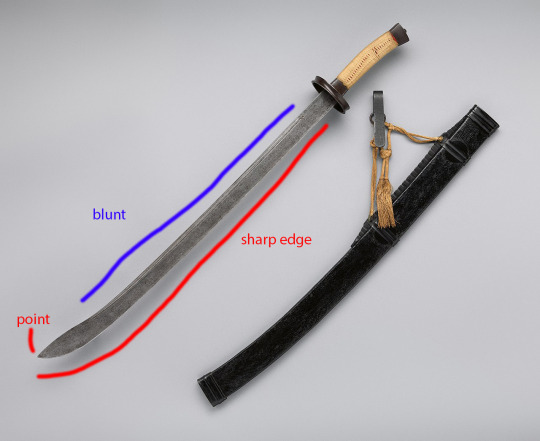
One of the main ways that a dao does damage is through slashing/chopping motions, either down, sideways, or upwards (which my sifu always called uppercuts). All upwards slashes with the dao require that you turn your wrist so that the sharp edge, which usually faces down, faces upward instead.
The other way that a dao does damage is via forward thrusts, where the point of the dao is supposed to pierce enemy flesh. The basic attacks I've mentioned above are in the beginning of this clip, and I've added text to the original video below to highlight what's what and what they're supposed to look like.
(n.b. I was just randomly searching for videos to show what I'm trying to describe, no endorsement intended).
One of the things you'll notice from the above video as well is that the master is putting his hand on the blunt edge. This helps stabilize and give more power to the dao through its various motions, and is a basic part of how dao forms are supposed to work.
The blunt edge is also important because it helps in defense. One of the cardinal rules of a dao is that when you are defending, the dao should be kept close to your body, with the blunt edge facing your body. This is what a basic block looks like:
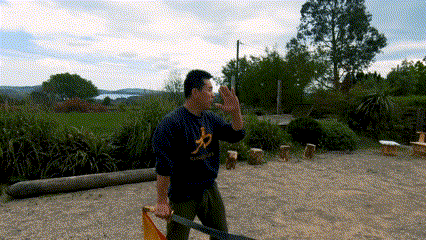
Should you get hit, you can brace the blunt edge of the blade using a shoulder or upper arm. In certain positions you can also use your hand as a brace on the blunt edge to stop (or execute) a particularly strong attack.
These are the dao basics. Now you have enough background to know what makes Di Feisheng's dao so unusual: it is double-edged, and it has a blunt tip.
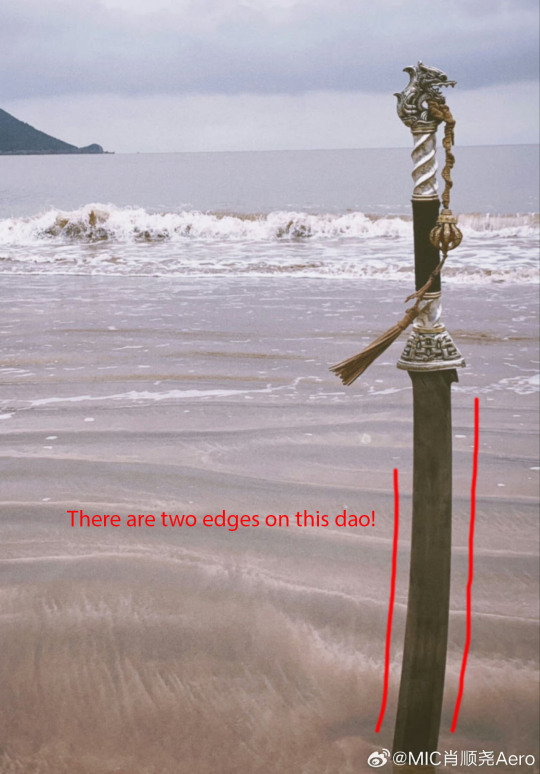
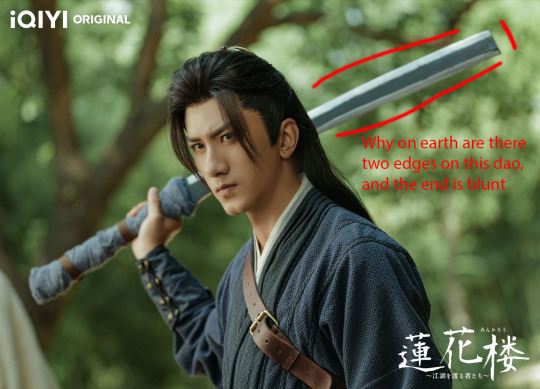
These two things must follow if you have a dao that has two edges and is blunt at the tip:
You are limited to slash and chop attacks as your main blade damage. Thrust attacks won't penetrate flesh unless you have a serious amount of qi behind it.
Your defense is limited, because you can't use your dao to defend in the usual way.
But wait, does Di Feisheng's dao really have two full edges?
If you're a details guy like me, and completely obsessed over Di Feisheng (guilty as charged), you'll notice that one the edges of his dao doesn't actually extend the full length of the blade:
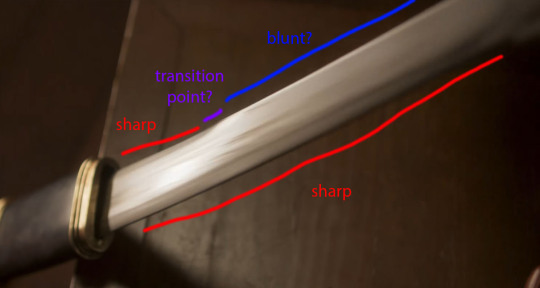
From the way that light reflects off the edges of his dao, you can see a bit on the short (inner) edge of the dao where the blade seems to transition from sharp to blunt:
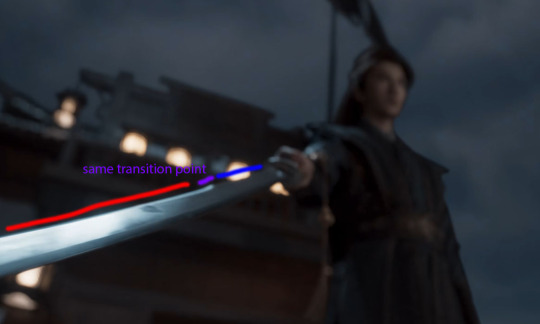
And this shot, it's confirmed that there is a short blunt area on the inner edge of his dao:
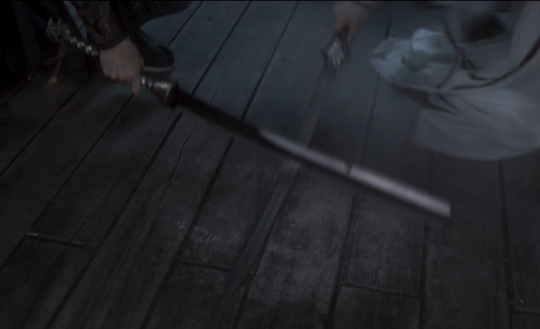
In this memorable scene, Di Feisheng uses his hand against the very short blunt part of his dao to press his attack into Li Xiangyi's cheek:
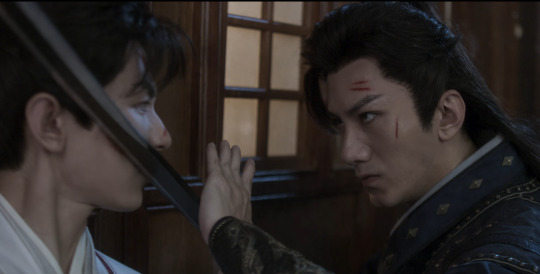
One of the upsides of his unusual dao is also that he can use the inner edge for attacking as well. Upward sweeps using the inner edge aren't possible with usual daos (because they are blunt), but are possible with Di Feisheng's dao. I think we see an example of that here in the way you see his arm sweeping upward. (He has also added a substantial amount of qi to this sweeping strike, most of us plebs don't have enough qi to do anything like this.)
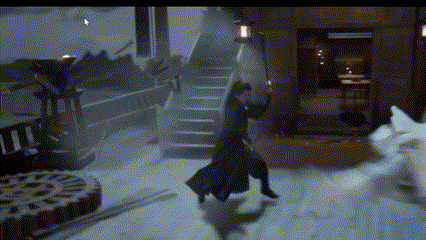
You can see how he gains some flexibility to his attacking capabilities, when he flips his blade mid-block into an attack:

While a double-edge gives him more adaptability in terms of attack on along the slashing and chopping edges of his dao, what he is losing out on because of the blunt end is thrust. You almost never see Di Feisheng thrust his dao forward because his sword just doesn't work like that.
In this final scene in the episode one fight when they are charging at each other, Li Xiangyi thrusts the Shaoshi Jian forward, but Di Feisheng, due to the design of the dao, has to slash:


However, most of the power of a dao is in its slashing and chopping motions. This is where the weight of the blade and its curved design (plus gravity and force) result in the most damage. Unlike the jian, the dao's thrusts do less damage. My conclusion about this is that it's a purposeful trade-off that Di Feisheng has made. He would rather maximize his offensive capabilities where they are strongest.
In terms of blocking, the design of Di Feisheng's dao means he's at a defensive disadvantage, since there's no blunt area to brace his body against for blocking (he can use his hand on the bit that is blunt, but because he has an edge along the rest of it, he can't use a shoulder or upper arm). This is a key feature of the standard dao that Di Feisheng's dao is missing.
In this move in the Battle of the Eastern Sea in episode 1, we see Di Feisheng execute a block, but he's got both of his hands along the hilt instead:

At this point, it should be noted that the standard dao is typically a one-handed weapon. The hilt is slightly curved, so you can get a good downwards chop with your wrist. There are other daos that have straight hilts and can be two-handed like the Miaodao 苗刀 (which is more similar to the Japanese katana 刀 than most Chinese folks like to admit). Di Feisheng's dao being straight-hilted and two-handed isn't that unusual because it's a feature that can be present on certain types of dao (it's way less unusual than the two edges!), but I thought it was worth pointing out in case any eagle-eyed readers noticed the difference between the Wikipedia image and what Di Feisheng has.
I could wax on about Di Feisheng's dao and his fighting style forever, but I think this thread has gone on for long enough.
I believe that the design of Di Feisheng's dao is very clever. At first glance, it seems utterly silly (what kind of dao has two edges?), but on deeper inspection of his style and how he uses it, it is consistent with his character.
He is always playing on Hard Mode because he is trading defense for more flexibility in his offense. And he is maximizing his offense where it is strongest (slashes and chops), and choosing to forego the offensive capabilities where it is weaker (thrusts).
...And that really is Di Feisheng's martial arts style in a nutshell, isn't it?
#mysterious lotus casebook#di feisheng#笛飞声#meta#莲花楼#Di Feisheng's dao#which is just named 刀#刀就是刀要什麼名字#i know more 刀 forms than 劍 forms and this is what i do with the knowledge#笛飛聲#蓮花樓#cdrama#cdrama meta#I'm sorry the GIFs are terrible quality I can't be bothered#also at some point I really want to an analysis of the choreo in the final fight#there was awesome shit being pulled by the choreographers that I've never seen in a wuxia
268 notes
·
View notes
Text
Female Power Done Right: A closer look at Pian Ran from TTEOTM
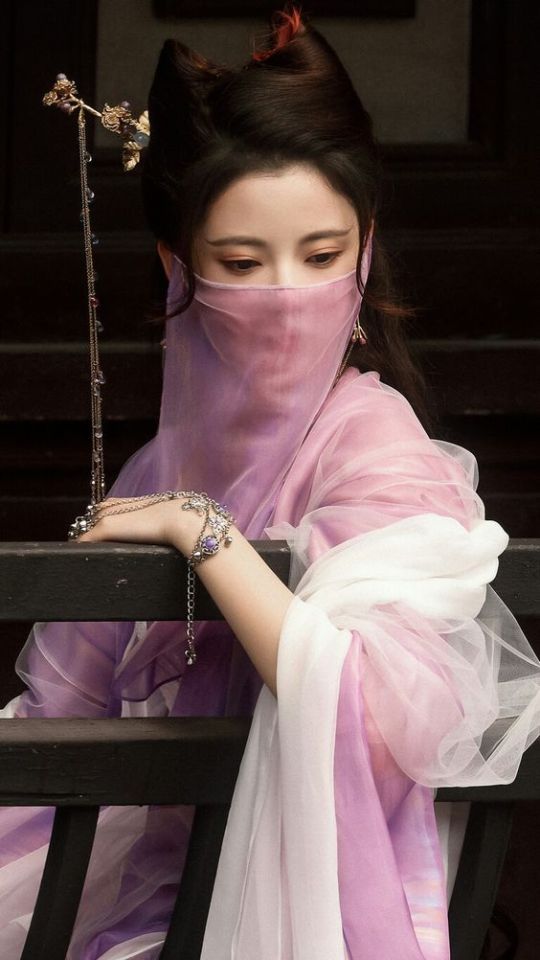
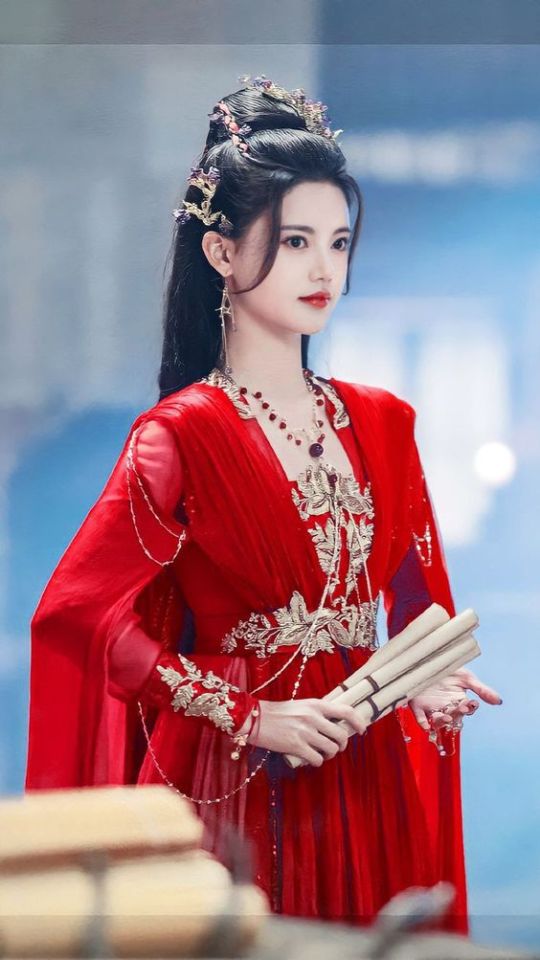
The seductress: regulating sexual morality
Female characters have always been stereotyped in popular media. While this isn't limited to the portrayal of women, it has affected them disproportionately and usually in a negative way. There are a number of common stereotypes of how women are portrayed, such as the virtuous woman, the seductress/femme fatale, the Mary Sue and more. While I don't want to say that TTOETM doesn't rely on these kinds of stereotypes to tell its story, the show does get some things right when it comes to its female characters. Pian Ran is the best example of this.
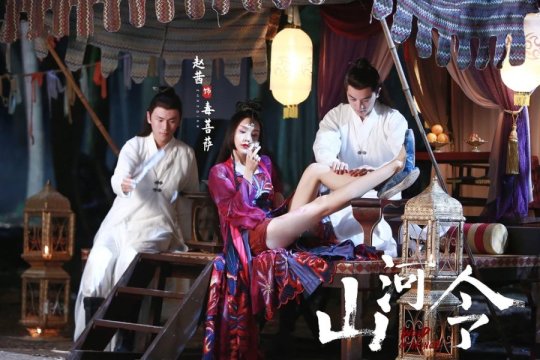
Most temptress are villains, because female sexuality is often framed as something negative, something dangerous. Sexual morality serves to regulate gender relations, for example through various sexual taboos and prohibitions on premarital and extramarital sexuality or homosexuality. In the major religions and many cultures, sexuality is traditionally placed in the service of procreation. In the ascetic-monastic traditions of Hinduism, Buddhism and Christianity, which are characterized by sexual renunciation, sexuality is equated with ignorance, desire, attachment or sin and is considered an obstacle to salvation. As women are identified more strongly with physicality than men, sexuality and instinctually in all the religions mentioned, the widely received stereotype of the sexual seductress emerges, which has been used to justify a wide range of discrimination.
Therefore, seductresses are not about female sexuality, they are (through the male gaze) objects of sexual desire for men, while also being a negation point of sexual morality. Virtuous women, especially protagonists, are often sexualised, but not portrayed as sexual beings. In contrast, sexual women are often the competition of the main character. They tend to use their physical attractiveness to attack or steal the main character's love interest, or to overpower the hero with their evil tricks. For this reason, they are often associated with animals that are seen as deceitful, cunning, poisonous or dangerous (e.g. snakes, scorpions, foxes).
At the first glance, Pian Ran fits this archetype well. She is a fox demon, who feeds on the life energy of men. She seduces them, using their sexuality for her own gain and entertainment. Pian Ran also dresses "provocatively" and doesn't conform to social conventions. When we first meet her, she is playing the historical version of strip poker, not just for the money, but because the desperate men amuse her. In the same episode, she forces Ye Qingyu to accompany her to the market and uses her sensuality to throw him off balance.
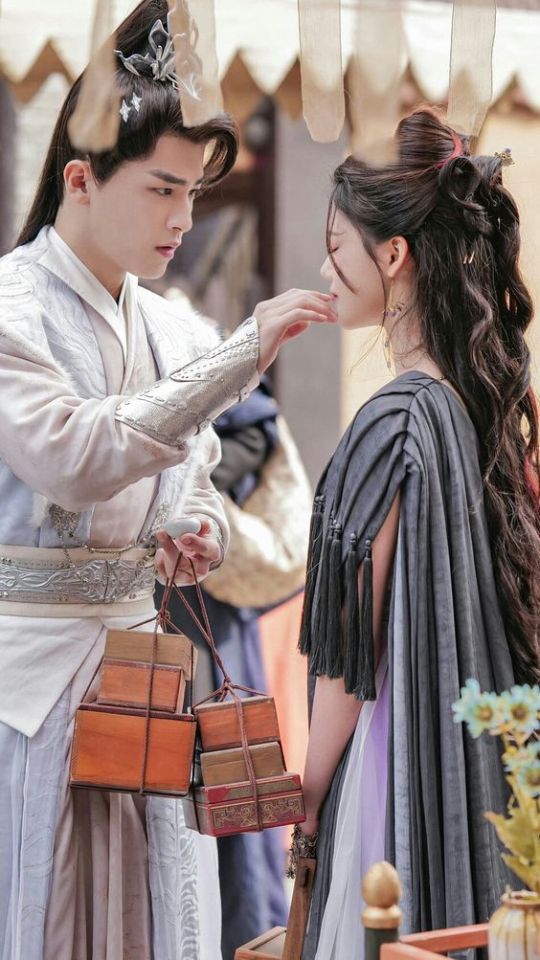
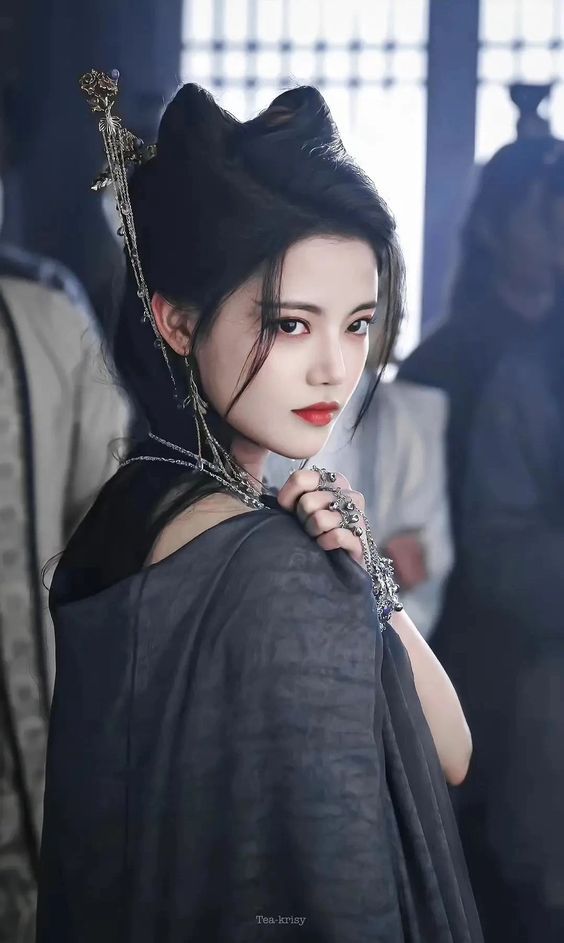
However, Pianran also subverts this trope. Her sexuality isn't portrayed as something negative, it's accepted by the people around her. Ye Qingyu never judges her for it, even though he is the polar opposite. Ye Xiwu never looks down on her either, instead she comes to him for advice and even flirts with her.
Sun Zhenni's performance deserves a lot of praise. Her sexiness doesn't feel "sticky" or "creepy" to me, like many other characters of similar type do. She has a natural sensuality that isn't over the top, more sassy than naughty. You can tell that she studied her character a lot and tried to portray her as nuanced as possible.
Pian Ran is also much more than just another fox demon and seductress. She is a complex character. But her main theme isn't really seduction - it's working life.
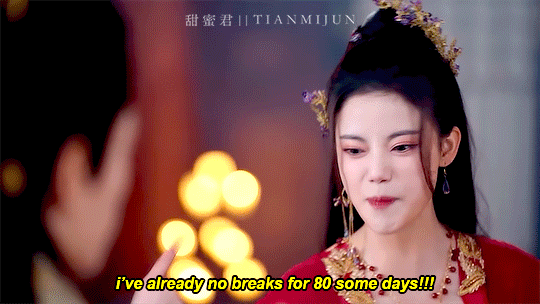
Pian Ran vs. work life
This theme runs throughout the drama, from Li Susu offering her a letter of recommendation for a particular sect when they first meet, to Pianran's work for Tantai Jin - and her resentment of it.
She has to work to survive - literally, as Tantai Jin tricks her into believing she has swallowed a pill that will give him control over her life. "Take the pill", which will change your life and take away your freedom, is also a reminder of how certain drugs and their side effects work. While she's not without a certain amount of freedom and has her own command within the Jing Kingdom, she's tied to Tantai Jin's command and rigorous work schedule.
Our girl is a for sure a regular on r/antiwork...
This theme makes her a relatable and likeable character. It also shows how her character is a comment on current social issues, beyond gender roles. This is one of the strengths of TTOETM, it’s strong social and moral message that goes beyond the plot of the drama.
Pian Ran vs. love life
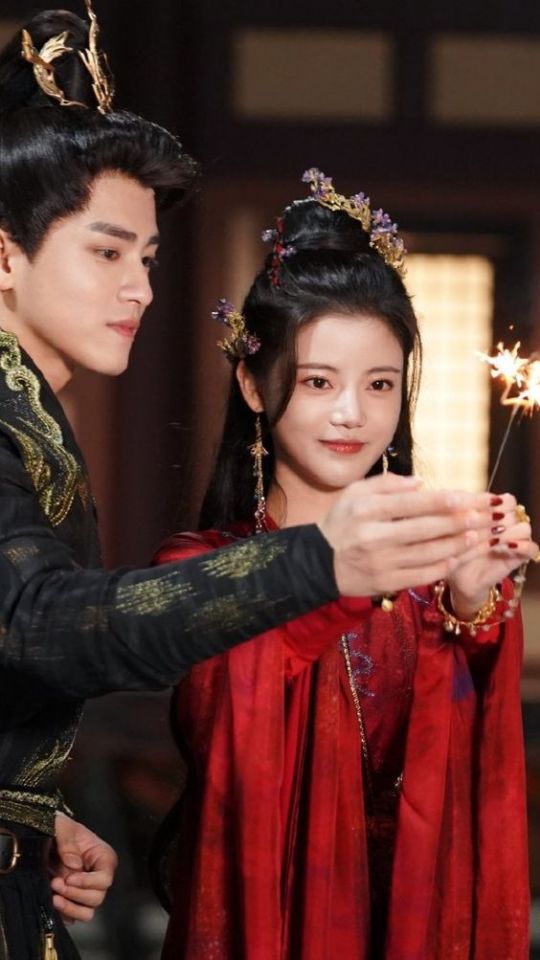
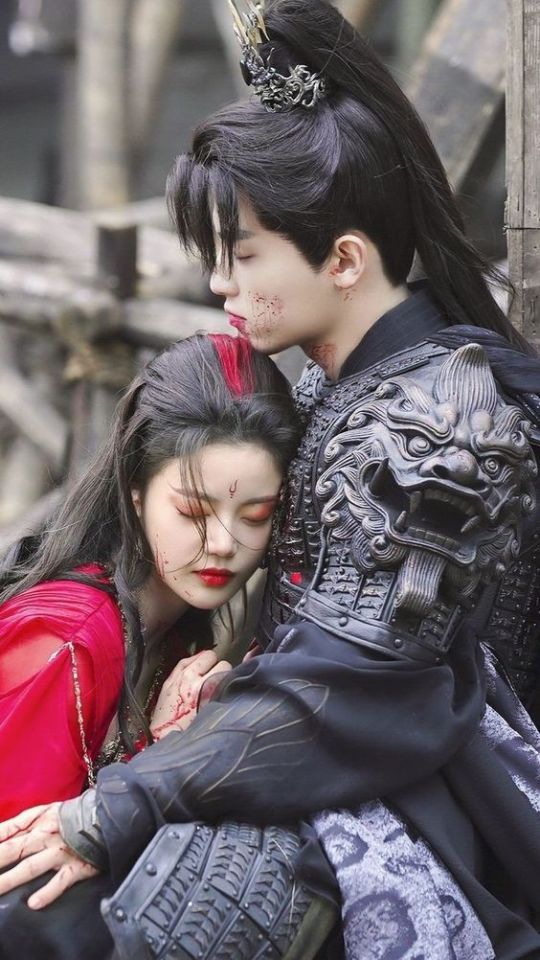
As a character, Ye Qingyu is the opposite of Pian Ran: Virtuous, very righteous and rigid. But he never judges her for her behaviour, he always understands her and gives her space. And most importantly, neither of them changes who they are as their relationship progresses. She doesn't suddenly become a modest woman, he doesn't turn away from his ideals - except maybe in that cut arc in Jing Kingdom in the 3rd arc.
In many ways, Ye Qingyu and Pian Ran embody the classic trope of the seductive and virtuous hero: she affects men in a certain way that causes them to stray from the straight and narrow or interferes with their domestic arrangements. For example, when he spends the first night with her and thus neglects his duties as head of the family, or when she contributes to his changing sides and joining Tantai Jin. In short, she is disruptive.
When she advises Ye Xiwu/Li Susu on how to seduce Tantai Jin, she suggests various manipulation tactics to gain his attention and favour, but Pian Ran also gives genuine advice - to both of them, actually (although sometimes it's my accident).
One could make the argument, that they were aiming to frame her initial strong sexuality as a coping mechanism due to the loss of her husband and love threads. The absence of her love threads manifests quite different to Tantai Jin, mainly in form of attachment issues.
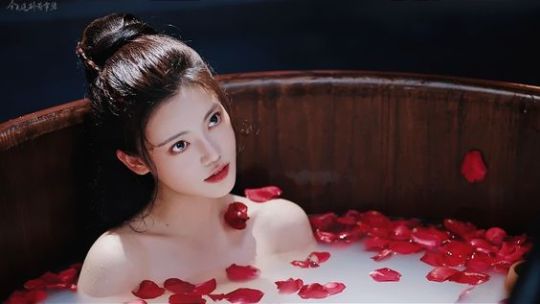
However, the show doesn't try to make a point about female sexuality by emphasizing a change in Pianran's behavior based on finding the right man. If anything, it's Ye Qingyue who meets her halfway by having a premarital affair. What I like most about their relationship is that they are each other's equals. They both have high ranks in Tantai Jin's kingdom and army, and he listens to their advice and treats them equally. Moreover, Pian Ran is never a damsel in distress. Even when Ye Qingyue dies for her, it is because she was blindsided by the attack while she was winning her own duel. In the end, she shares the fate of most seductresses who disrupt the social order - she dies (if they don't join a convent). The difference is that her death is a tragedy and not framed as a regulation of sexual morality and gender relations.
Female Friendship
Before I dive into the relationship of Li Susu and Pianran, I want to comment on the common dualism of the sensuous vs. the virtuous woman. Li Susu (or Ye Xiwu) is not the virtuous heroine, it’s (again) Ye Bingchang mirroring Pian Ran. This is something that subverts the whole trope! It's the virtuous woman who become disruptive and falls from grace, while Pianran becomes a righteous heroine. However, while Pianran doesn't become virtuous, Ye Bingchang tries and fails to use seduction to manipulate Tantai Jin. She also has an additional set of love threads that make her seductive to men without using her sensuality or sexuality. It's a fascinating dynamic. As I said, TTEOTM is not a perfect show with a feminist message, but it certainly tries to subvert gender stereotypes - and not just with its women, but that's another issue.
Pian Ran's third important role in TTOETM is that of Li Susu's friend, who supports and guides her. What makes their dynamic so interesting is that while Pian Ran looks younger than Li Susu, she is considerably older (well, if you count age by years lived, not by date of birth). They are flirtatious, they share a horse and a bed, and they pass the Bechtel test! Li Susu even risks her health to cure Pian Ran of Tantai Jin's blood curse.
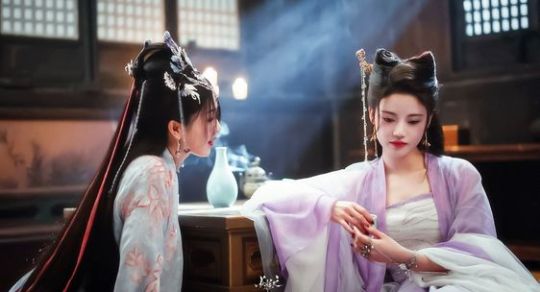
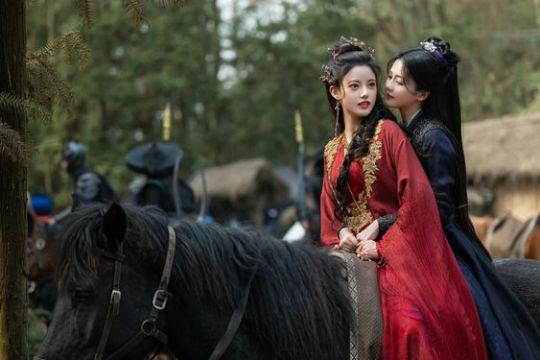
Both subvert gender expectations in their own way. They are strong characters without abandoning their femininity. The empowerment and the feminist ideas, they are embodying, also come natural to the storyline and are not just tropes. Therefore, they are relatable characters for a modern audience (except when they are not).
Edit: Got rid of some spelling mistakes!
116 notes
·
View notes
Text
why Du Cheng can't hold a grudge: a little 猎罪图鉴 | Under the Skin meta
When Shen Yi first joins the Beijiang City precinct, Du Cheng can't stand him. Not only is he still pissed off about Tragic Backstory, but he doesn't believe a sketch artist can hold any real value, especially not in our era of policing via surveillance. In another drama, he might have continued to nurse his animosity for the duration of the season. But there's one moment very early on which expresses Du Cheng's whole character so succinctly that you know he'll very soon give it up, and quite quickly succumb to Shen Yi's charms usefulness.
First, though, he stomps into Bureau Chief Zhang's office pitching a fit about Shen Yi, of all people, occupying the late Captain Lei's office. But Zhang-ju is not a woman to be messed with. She promptly calls his bluff.

Du Cheng, still hacked off, doubles down. He throws his badge on her desk. Fine! Fuck being a cop! He'll deliver pizzas! Anything, not to have to work with THAT VERY PRETTY GUY.

But then Jiang Feng comes to the door to announce that a body's dropped. Try to sound a little less thrilled, please, Jiang Feng.

A murder you say??? This is Du Cheng catnip. Can he hold out?

Look at his big dumb head swiveling around helplessly, like someone's just announced there's free cake in the break room.
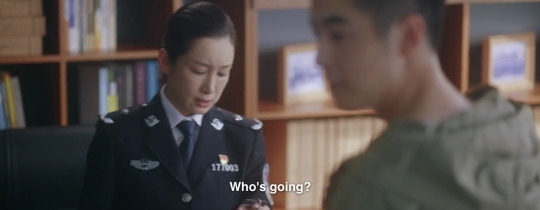
Zhang-ju is canny as fuck, though. She looks down at his badge and idly wonders aloud who's going to catch this one. No idea really. Who could it possibly be.

At this point, Du Cheng has managed not to be a police officer for a whole fifteen seconds.
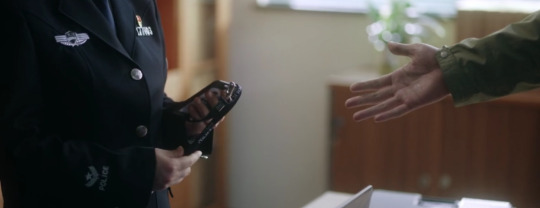
UGH FINE GIVE ME MY BADGE BACK YOU WIN. But Zhang-ju has not finished winning.
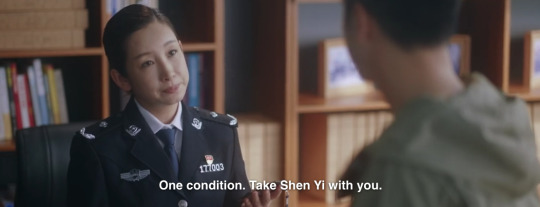
(This woman is a mother of four or I will eat my laptop.)
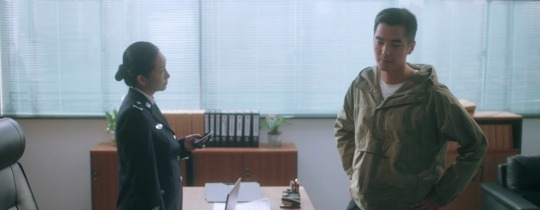
Du Cheng has to pretend to think about this for another whole three seconds or so.

UGH FINE JUST GIVE IT BACK I'LL TAKE HIM WITH ME OKAY? OKAY???
(And then they proceed to drive off without him anyway, so that our little hero must ride to the crime scene alone on his bicycle. But the ways in which Shen Yi returns everyone's cold shoulder with this kind of serene tai-chi-like nonresistance is another meta entirely.)
All of this underscores two things: 1) Du Cheng's compulsive need to clear cases himself, and 2) his imminent practicality about so doing. When it turns out that Shen Yi is actually incredibly useful, Du Cheng stows his shit with remarkable rapidity and they do an enemies-to-friends speedrun in like three episodes, because nothing else matters to Du Cheng like solving crimes. It's truly the way to his heart. And when Shen Yi gets captured by Cai Dong in episode 3, what does Du Cheng say? "He's got one of our own." It's not just blind loyalty to the force; Shen Yi has already proven to Du Cheng that he really is a cop.
(And, ACAB; and China suffers from massive police corruption. So this procedural, like all the others, isn't reality, isn't a valorization of police work, but is probably some secret third thing.)
24 notes
·
View notes
Note
I'm nervous about all of these upcoming dramas that chronicle the life of a female character like legend of jewelry and flourished peony I left like blossoms of adversity could've used more episodes most of the great shows that depict this kind of story like Story of Ming lan and Story of Yanxi palace are 70 plus episodes because you need the room to slowly build up your story and characters but now every cdrama has to be 40 eps or less and that's really not how you do art you can't just confine every single story into a specific number of episodes the writing/pace/development will always suffer
I think we are right to be very concerned about dramas already filmed that now have to be edited down to 40 episodes. When done with due care, I think they can still be very worth watching (it's the supporting characters that will suffer but likely not the story of the female lead; they'll slice down the secondary couple and SML.) But if the production team isn't preoccupied with quality and/or isn't given the budget for a good editor to invest the time to get it right... 🙈
For the dramas not yet filmed, I honestly am fairly confident. Competent directors and screenwriters can certainly draw on their creativity to tell a full & satisfying story in 40 forty-five minute episodes. We have seen how cdrama artists can still flourish despite constraints. Short dramas like Butterflied Lover and Provoke, which created compelling stories with little budget & screentime. Censored queer dramas that tell a second story between the lines.
There are 2 common set ups for tv production:
[1] the multi season storytelling style that plots a portion of the story bit by bit. You get the beginning arc - maybe the story continues; maybe it's cancelled. You get another arc - maybe the story continues; maybe a major actor doesn't renew so their character suddenly is eliminated from the narrative; maybe it's cancelled. You get another arc... You maybe get an ending?? (prayers up!) Which often doesn't resemble the writer's original vision, because of casting changes or because another show aired their idea first, or because the writer's opinion on a ship or character changed due to interactions with fans (positive or negative).
[2] a complete story is filmed, with a beginning-middle-end, and it's released as a whole 22 or 34 or 40 episodes.
I'll be honest, after many years of experiencing type 1... I am so, so over it. I will take some annoying limitations and a constraint of 40 episodes any damn day if you can deliver me a coherent narrative that delivers an arc that is solidly closed - where I actually get to experience the complete vision. That's my personal preference for how to do art as television.
I think it's wonderful that in the last few years, through kdramas and cdramas, I've been able to enjoy so many complete stories centered around the growth of a strong female character. And I don't take that for granted. So let's think positive, my anon friend. Bring it on!
#silvia answers asks#fandom meta#cdrama meta#please c-ent do NOT fall into the cursed multi season trap#that to me is the death of art#kill it with fire#just imagine what disney+ or netflix would have done with story of minglan#(shudders)#it would have been cancelled after 12 episodes#and gu tingye recasted in s2 - slightly less famous guy with good cheekbones and a six pack
12 notes
·
View notes
Text
wuxia, xianxia, and cultivation differences meta
translations: wuxia 武俠, xianxia 仙俠, and cultivation 修真/修仙 (xīuzhēn/xīuxiān)
think i've seen posts on this eons ago, and i'm pretty sure there are tons of these online, but since this has been written up already let's just have another one.
wuxia 武俠
wuxia and xianxia sound similar, but basically for wuxia it is about the pugilistic world (江湖 jiānghú). It is relatively more down-to-earth, and people practice martial arts ("kungfu") in their current life -- they do not do it to become xians (仙) and gods (神) however.
Like Thousand Autumns and Faraway Wanderers/Word of Honor, it has more historical background and ties to the current court and kingdoms, because people are living in the moment and concern themselves with worldly issues.
Martial arts may seem unrealistic, but in view of chinese fantasy it would be considered "real". It consists of fighting moves and internal energy, which they call qi or nèigōng (內功), and at times you see people flying around, climbing hills and jumping across rooftops which is qīnggōng (輕功).
xianxia 仙俠
A level up would be xianxia, where characters in the story cultivate to become xians (and gods, like in the heaven official's blessing). They don't really care about earthly issues here now, because their ambitions lie beyond the current world, and cultivation, getting stronger, and an immortal life are majorly all their goals.
You may not always see them working towards that purpose, such as in mdzs they are considered a lower-xianxia society (低魔), meaning people don't go through all the steps of cultivation and only stay at the stage before the "golden core" stage.
In xianxia, characters still learn basic fighting moves aka. martial arts, but to direct the internal energy they use línglì (灵力), zhēnqì (真气), and fǎlì (法力), all xianxia terms you commonly see. "neigong" is practically nonexistent in this genre. That's why people building up their "neigong" instead of "lingli" are likely never going to be able to cultivate.
cultivation 修真/修仙
A subgenre in the xianxia category would be cultivation. Characters actively go through the stages of cultivation, and likely for the MC, because they are the main character, they successfully become a xian and exit the world at the end of the novel.
There are many stages of cultivation, usually defined at the beginning of the novel in the synopsis, and a typical example of the different levels would be this:
练气,筑基,金丹,元婴,化神,炼虚,合体,大乘,渡劫
And with a cursory search, an English translation would be something like this, albeit not with all the cultivation ranks identified.
Qi condensation (练气), Foundation establishment (筑基), Core Formation (金丹), Nascent Soul (元婴), and the names after that vary too greatly with translation and fandom so I'll jump straight to Immortal Ascension
extra info: getting into the philosophy of it all
It'd be interesting to note that the word "xiá" (俠) permeates all these genres. This is something akin to the concept of "hero", but not at all also, and I'd love to speak more on this but this post has already gone way longer than I hoped it would be, so perhaps another day.
Regardless, it is interesting to note that wuxia has a greater emphasis on "xia" than xianxia. (some joke that cultivation doesn't have the word "xia" in it, and much of that is because characters have foregone heroism and focused on gaining powers and working towards ascension instead). As a result, wuxia is more confucianism-oriented, though not without its taoism and buddhism influences.
xianxia, on the other hand, is mainly derived from "dào" (道), from taoism, which is another lengthy concept if I ever get to it.
And some may have heard of the "farming" genre, 种田 (zhòngtián). This has to do with golden fingers (mary sues) in imperialistic china, earning a wealth of money, and all that. It has nothing to do with cultivation, alike they sound in english.
that's it for now, hmu if you wish to ask/discuss!
(and apologies for the pinyin translations, hope it's understandable still! formally writing pinyin they are supposed to be two separate words not one.)
#danmei#mdzs#word of honor#cdrama#thousand autumns#cnovel#wuxia#xianxia#cultivation novel#chinese language#chinese#fate's meta
3K notes
·
View notes
Text
In Blossom visual analysis (ep. 1-7): How to film a gothic romance
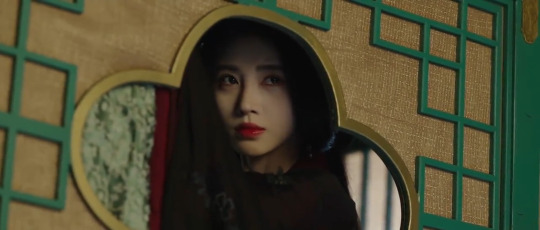
Although I'm not completely convinced about some of the writing choices of In Blossom, I absolutely LOVE the show's production design and cinematography. @mademoiselle-red wrote a great post about how main character Pan Yue fits the gothic romantic lead archetype, and those gothic elements are not only present in the script but also in the show's visual storytelling.
Lighting

A key element of gothic romance is its atmosphere of mystery and suspense.
Something I really like about In Blossom is that despite its dark subject matter, many of its scenes take place during the day. One of the show's main themes is that appearances can be misleading and the cinematography often plays with that notion by linking light to deception and darkness to truth. Note how many of the emotionally honest beats of Yang Caiwei and Pan Yue's relationship happen at night (e.g., their couple escapades at the Li Residence, Ghost Market, and Life and Death gambling house) while fakery, corruption, and evildoing happen in the day. It's with this subversion of our expectations for light that the show creates an unsettling atmosphere.
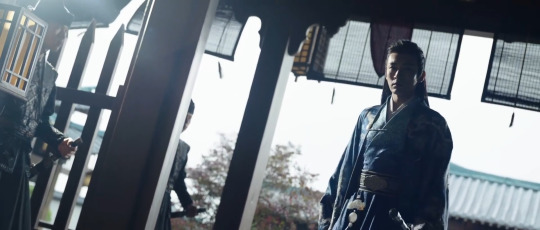
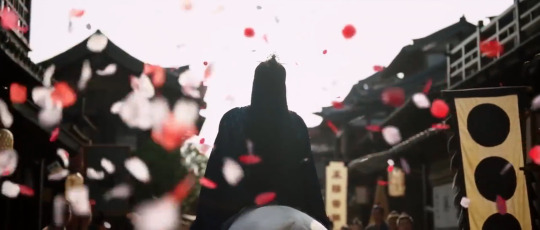
And these lighting choices also help set up Pan Yue as a classic gothic romance anti-hero, someone the female lead, Yang Caiwei, fears but still finds herself drawn to.
Look at how Pan Yue is lit when shot through Yang Caiwei's subjective point of view. The strong use of light creates a lot of contrast--through her eyes, he is a mixture of light and dark, his morality as inscrutable as his shadowy figure.
Camera Angles and Shot Sizes

The show's use of low angles and close-ups further reinforces the idea that Pan Yue is unpredictable and even dangerous.
In cinematography, low-angle shots tend to make the subject look more powerful and menacing, and the show uses this technique to great effect.
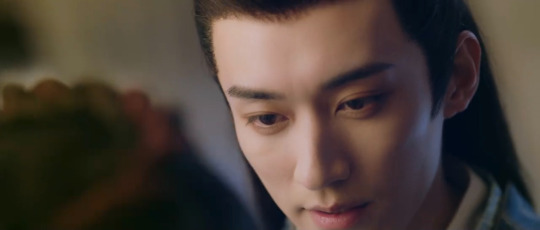
Even in the intimacy of close-up shots, we can sense the threat emanating from Pan Yue. He’s always shot just a smidgeon too close for comfort.
For example, look at how much Liu Xueyi's face fills the frame in an early "romantic" scene. The shot feels almost claustrophobic as if he's so single-minded about his goals that he has no choice but to dominate the frame (and Yang Caiwei). It's an unnerving moment despite the soft words coming out of his mouth.
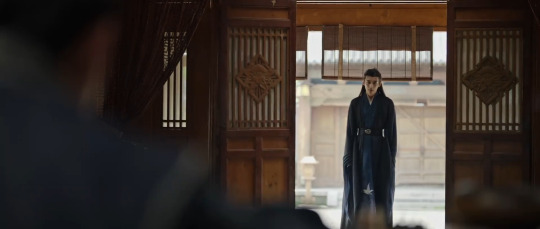
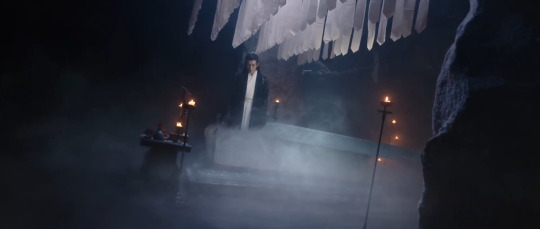
Side Note: I live for Pan Yue's (vampiric) long shots. The production design team was smart for dressing the character in dark clothes with such a sleek cut and drape--he looks like a sexy bat.
The Nosferatu references in Yang Caiwei's tomb are also perfect.
Composition and Framing
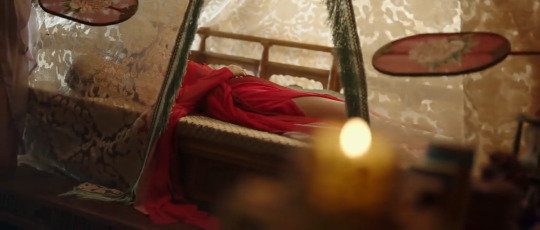

And finally, like any good gothic romance, In Blossom illustrates how love can drive one to despair and even madness.
Because of this, my FAVORITE scene of the show has to be the introduction of Shangguan Zhi. Her obsessive pursuit of beauty in hopes of seducing Pan Yue has left her a shell of a human being, and the scene's composition perfectly encapsulates this with how it focuses on the elegant lines of her body--not her face or personhood.

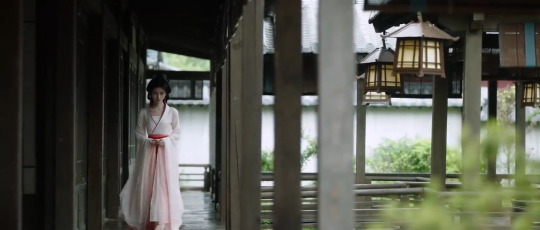
Shangguan Zhi is trapped by her delusional fantasy of a life with Pan Yue--see how she's boxed in by the vertical lines of the screen panel she admires--and the show regularly uses architectural lines to show how her desperation has trapped Yang Caiwei as well.
149 notes
·
View notes
Text

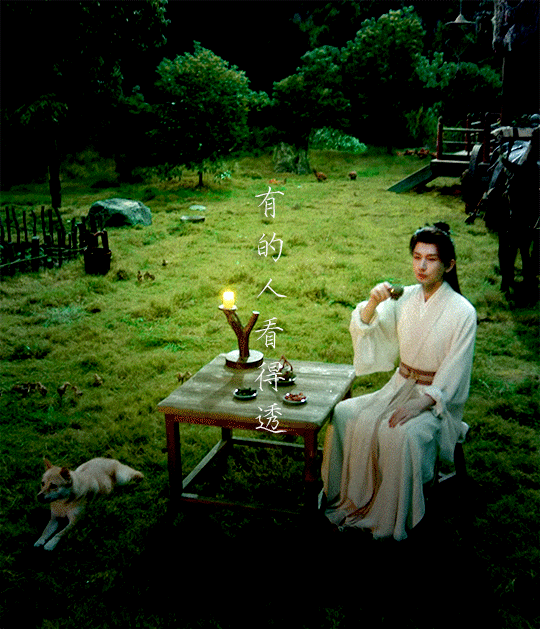
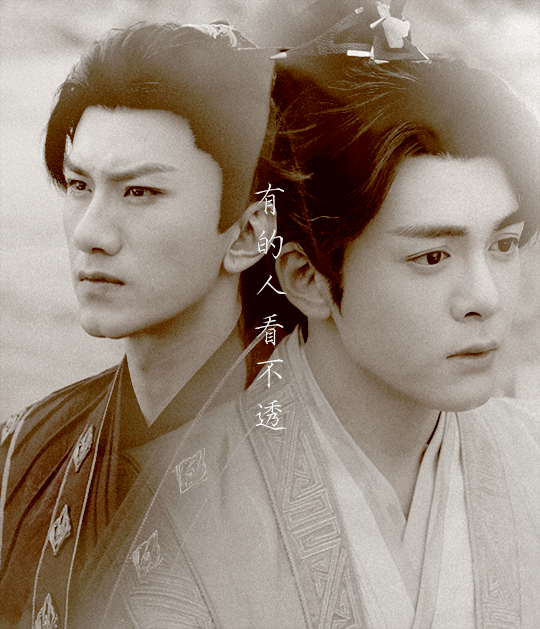
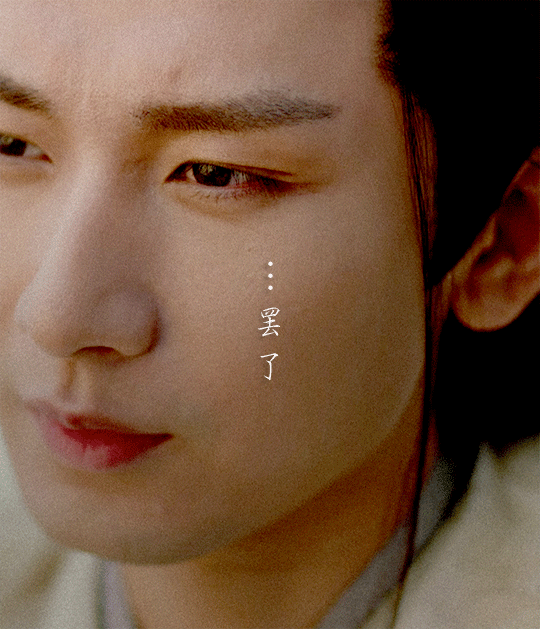
人生在世皆在自渡。有的人看得透有的人看不透罢了。
life is all about self-deliverance. some see through it, some don't. that's all.
莲花楼 mysterious lotus casebook
#莲花楼#mysterious lotus casebook#asiandramasource#dailyasiandramas#cdramasource#asiandramanet#cdramagifs#cdramanet#cdrama#cheng yi#xiao shun yao#joseph zeng#lhlgifs#my posts#jielin's edits#drama#just know that ''he hasn't gone anywhere. it is everyone else who lacks the ability to see him.''#from mark's meta is on my mind while making this#also the line is said by fdb in a different context in ep 31 buuuut. does he knowwww does he know. yeah#they don't see him (yet) and they'll have to get there in their own ways#more and more i think about how he has been self-sufficient and contented for 10 years#he had already saved himself 10 years ago#it is that the world tells him he's not and he needed to do more#it is the struggle between having a life of freedom and being human and thus being connected to other people#also three cheers for difang yay
202 notes
·
View notes
Text
Character Names in LBFAD – Meaning and Significance
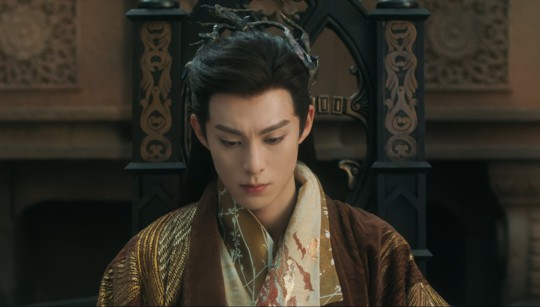
What’s in a name? For the characters of LBFAD (Love Between Fairy and Devil), a whole lot of hidden meanings! These are not apparent to English viewers. Here are my translations and interpretations of these meanings.
DongFang Qing Cang - 东方青苍: “East, Cyan, Dark blue”
The surname “DongFang” means East, the direction of the rising sun. Both Dongfang Qingcang’s (DFQC) personal terrace at Silent Moon Palace and the replica Arbiter Hall he built for Xiao Lanhua (XLH) face East, and capture the most beautiful sunrises. DFQC (and previous generations of DongFangs) are well-respected by their people and enjoy the best locations and residences in Cangyan Sea.
The “Cang” in DFQC was named for his realm, “Cang” Yan Sea, as he was expected to be its leader and follow the path set for him by his father, and Lady Yan before him. Lady Yan chose to rid herself of emotions in order to wield Hellfire, and DFQC’s father forced the same decision onto him. The hanzi (mandarin character) for “Cang” in DFQC and Cangyan Sea means dark blue, and the darkness of this colour represents the darkness of the path he was expected to follow.
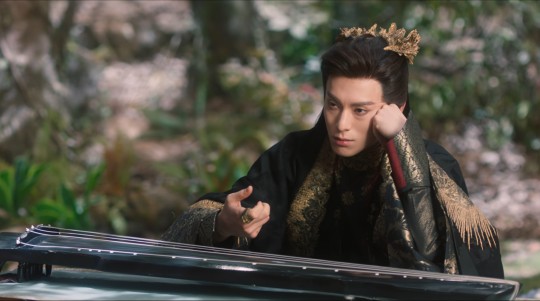
But “Cang” is not the only colour in DFQC’s name! The “Qing” in his name means lighter shades of blue/green, or cyan. And despite his prescribed mission to emotionlessly conquer the three realms, DFQC has many lighter, more peaceful shades to his character that reveal themselves as the series progresses. He forms a friendship and brotherhood with his enemy Changheng, who shares with him a love of playing music, art and cuju! And he rises above the cruel dictator of Shuiyuntian who almost annihilated his people, by sending his people to aid Shuiyuntian.
Xiao Lan Hua - 小兰花: “Little Orchid Flower”
We are first introduced to our female lead as “Xiao Lanhua”, which is not a name, but a description of what she believes her true form to be, a little orchid flower. But this was a disguise given to her by her parents and upheld by Siming. Her real name is Xiyun.
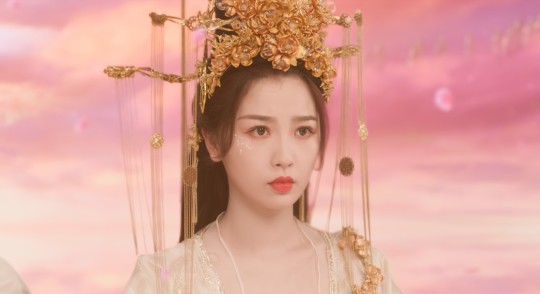
Xi Yun - 息芸: “Every breath”
The character for “Xi” in XLH’s true name is the same as the “Xi” in her realm, “Xishan”, and means breath (of life). Just like DFQC, she is named for her realm, as she was the intended leader of Xishan as its Goddess. The Xilan tribe of Xishan had powerful healing magics, and hers is the most powerful of all, with the ability to resurrect the dead with her blood, thus providing the breath of life. She uses this to great effect, resurrecting DFQC in ep. 26, everyone who died on the battlefield in ep. 31, and freeing the 100,000 sealed soldiers of the Moon Tribe.
The “Yun” in her name meaning every, combined with “Xi” can be interpreted as “every breath”. Sadly, XLH’s every breath is for one purpose and brings her closer to her one destiny. She is fated to sacrifice herself to save the three realms from Taisui. If this had happened, then like Lady Chidi before her, her sacrifice would soon have been forgotten.
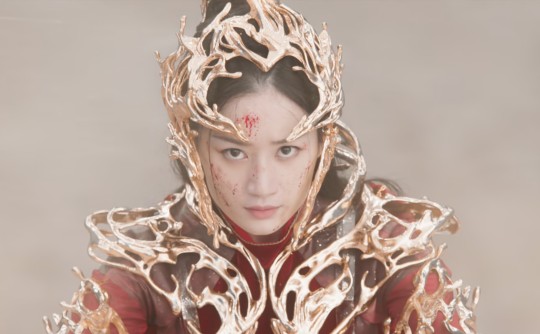
Chi Di - 赤地: “Red/Barren Earth”
The “Chi” in Lady Chidi’s name means red, and paired with “Di” meaning earth, can also mean barren earth. She is the only official in Shuiyuntian seen wearing Red, as even the current God of War, Changheng, conforms to the same white and pale blue robes that other officials wear. Chidi is therefore a standout who asserts her individuality and does not conform to expectations. Her way of thinking outside the box, led to DFQC and his 100,000 Moon Tribe soldiers being completely blindsided by her sacrifice 30,000 years ago. It also led to her breaking heaven’s laws to resurrect Ronghao, to her later detriment.
Chidi wields powerful earth magics, as represented by her name. These are so powerful that she is able to seal the 100,000 soldiers of the Moon Tribe within the barren earth of Xuanxu realm. Her mighty Shuofeng sword is also swallowed by the barren earth and her magic cannot be reversed without her primordial spirit.
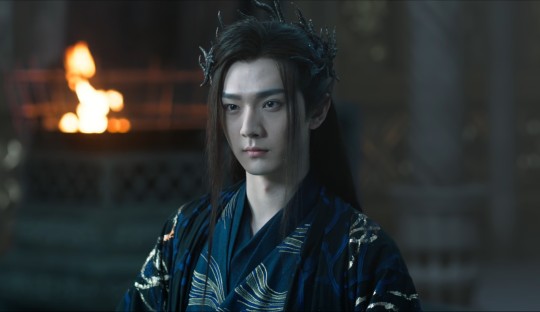
Xun Feng - 巽风: “Obedient wind”
The “Xun” in Xunfeng means to obey, and the “Feng” means wind. His name can be interpreted as either “obedient to the wind” or an “obedient wind”. Like the wind, Xunfeng lacks substance, confidence and ability, and is disrespected by his people during DFQC’s imprisonment. Many contenders try to steal his position as Moon Supreme, and he almost dies on the Wind Plain until DFQC arrives to save him.
But Xunfeng cares fiercely for his people. In his attempt to protect them, he collaborates with Ronghao without knowing his identity or motivations. He is thus “obedient to the wind” where Ronghao is an unknown and unseen entity, like the wind. Xunfeng is unable to discern that Ronghao is keeping Cangyan Sea in a constant state of civil unrest and tormenting the souls of deceased Moon Tribe members until much later, with DFQC’s help!
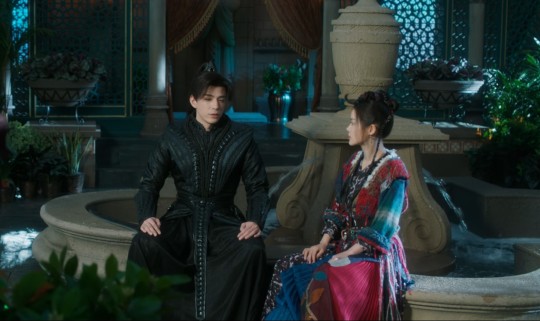
Shang Que - 觞阙: “Watchtower”
“Que” meaning watchtower is an apt description for DFQC’s lieutenant and right-hand man. Shangque has many talents suiting him to this role! These include his ability to be stealthy, gather information discreetly, undertake covert missions successfully, act as a powerful defensive force, and a healing one due to his skill with Chinese medicine. Like a watchtower, he kept watch for 30,000 years during DFQC’s absence on all events occurring within the three realms. His loyalty and love for DFQC, whom he views as a brother and whose return he awaited for 30,000 years, are astounding!
“Shang” paired with “Que” can mean lacking sustenance. This is the state Shangque was in when orphaned as a young boy, and many tried to take advantage of him and his dragon body. If not for DFQC saving him, he would likely have perished from hunger or been murdered :(
Jie Li - 结黎: “Dark knot”
Jieli suffers from much internal torment which is like a dark knot inside her. From the moment she was born, she never knew or received love, and was raised by people who continually exploited her, physically harming her and threatening her life. That she is even capable of loving and caring for others is a miracle! Unlike Shangque, nobody like DFQC ever stepped in to save her and care for her.
Jieli cares deeply for both XLH and Shangque. Her life under threat, she makes some bad choices such as spilling a drop of Chidi’s blood onto the Bone Orchid. This is one of many dark and knotty situations she encounters. Although she soon decides she would rather die than hurt XLH, Dieyi poisons Shangque to force her obedience.
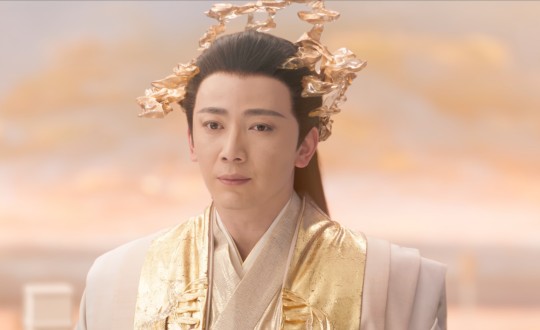
Yun Zhong - 云中: “Among the clouds”
Yunzhong literally lives among the clouds, but his head is also in the clouds. He is very narrow-minded and cannot think outside the box. When XLH does not fit within the eight-class system of Shuiyuntian, he immediately decides she is Moon Tribe (even before the Bone Orchid protects her) without considering other possibilities. He is so strict with Changheng that he would rather execute the most powerful asset to Shuiyuntian (and his brother!!) than tolerate the slightest disobedience! Throughout the series, he is intent on exterminating the Moon Tribe and almost does in ep. 31 on completely false pretences.
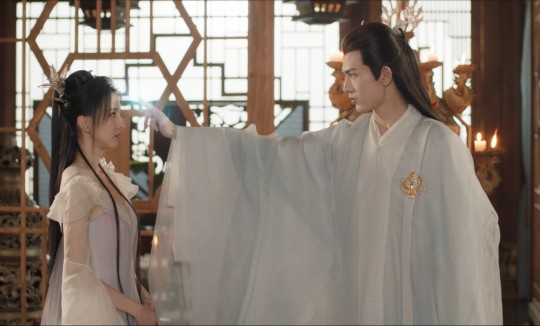
Chang Heng - 长珩: “Steadfast bird”
Like the golden bird brooches that the celestials wear to represent their tribe, Changheng is a model citizen of Shuiyuntian. He is steadfast and loyal to his duties and puts these above his personal desires. When trying to rescue XLH from Cangyan Sea in ep. 13, he is honest with her that he cannot break the rules of Shuiyuntian, and only hopes that Yunzhong will be reasonable and lenient towards her! Changheng is far more steadfast and loyal than the average celestial. He is the only one apart from Ronghao to visit Chidi’s grave on her death anniversary, honours his brotherhood with DFQC after returning to the immortal world, and after learning Ronghao’s secret identity, listens to his side of the story.
Dan Yin - 丹音: “Crimson tidings”
Twice, Danyin is the bearer of important news, relaying her visions from the Tianji mirror to the sacrifice of her own desires. First, she tells a wounded and imprisoned Changheng about his wedding to XLH in the mortal realm, causing him to start a mortal tribulation. Then, she tells Yunzhong and the High Council about XLH’s true identity as the Goddess, saving Changheng from execution and leading to his wedding with XLH.
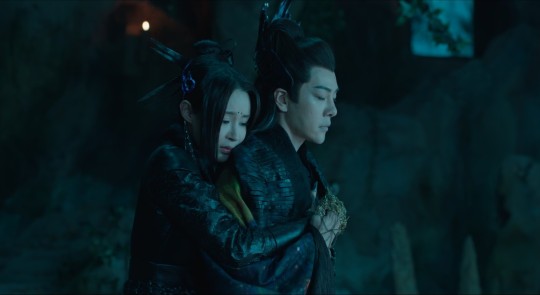
Rong Hao - 容昊: “Vastly compromising”
Ronghao has “one tiny earthly desire”, that his beloved master can live. What he is prepared to do to achieve this includes burning the souls of dead celestials and Moon tribe, massacring the entire Xilan population including their women and children, forcing his master to endure 30,000 years of cruel mortal tribulations and using evil qi to keep her alive. His willingness to vastly compromise both himself and her leaves Lady Chidi aghast.
Die Yi - 蝶衣: “Butterfly costume”
Dieyi is a shape-shifter and the different forms she takes, butterfly or woman, are her costumes, which help her to be sneaky and nefarious.
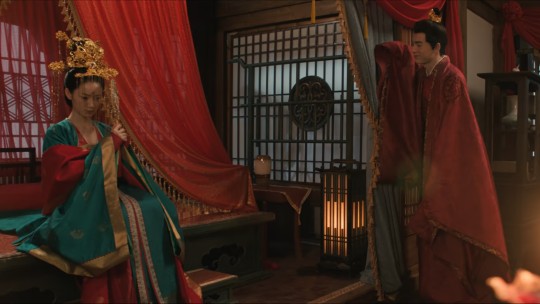
Xie Wanqing - 谢惋卿: “Withering sigh”
Having forgotten her life as Lady Chidi, Xie Wanqing feels incomplete without knowing why, expressed by her sad sighs. Chidi is forced to endure countless mortal tribulations just like this one and die (wither) repeatedly. (In the novel, in each of these lives she is condemned to be murdered by the one she loves!)
Xiao Run - 萧润: “Mournful wealth”
Both Xiao Run and his true self as Changheng come from positions of wealth and noble status. But both of them mourn the loss of freedom that comes from this – although Xiao Run is more of a carefree rebel! :D
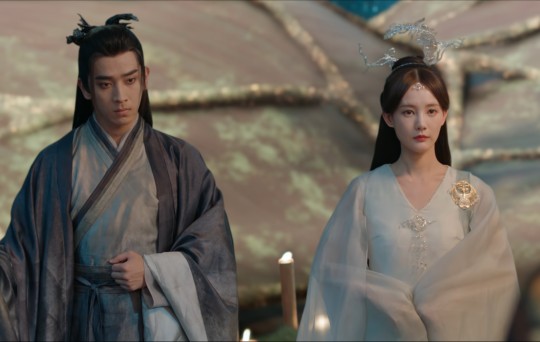
Si Ming - 司命: “Arbiter of fate”
Using the power of her position as Arbiter of Fate, Siming has repeatedly defied heaven’s laws and changed fate! She resurrects Ronghao as an immortal, creating a new destiny leaf for him. She released the convicted dragon Chang Yuan and married him. And she instructs DFQC on how to also defy nature’s laws and change destiny! :D
Chang Yuan - 长渊 “Steadfast abyss”
He is the deep abyss that Siming falls into, as in choosing him, she accepts the fate of being imprisoned with him in the Ruins of Myriad Heavens for the rest of eternity. But at least he is steadfastly loyal to her.
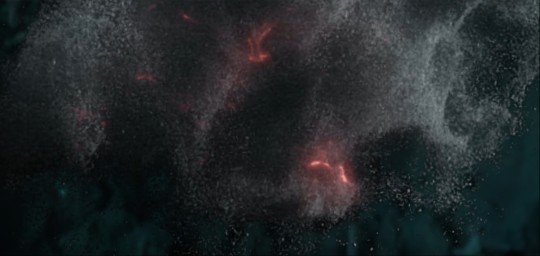
Tai Sui - 太岁: “Very Ancient”
This most ancient of tricksters could not be defeated by numerous generations of Goddesses, who merely sealed him beneath Xishan. Over his very long life spanning hundreds of millenia, he has learned to tell whatever lies are needed to manipulate others and ensure his survival.

Here is a link to my article: Location Names in LBFAD – Meaning and Significance
All of my LBFAD articles can be viewed with the tag #lbfad reflections (hyperlinked) and the table of contents to these is here.
#lbfad#love between fairy and devil#canglan jue#clj#dongfang qingcang#dfqc#xiao lanhua#xlh#cdrama#lbfad meta#cang lan jue#lbfd#cdramasource#asiandramasource#asiandramanet#dylan wang#wang hedi#yu shuxin#esther yu#lbfad reflections
102 notes
·
View notes
Text

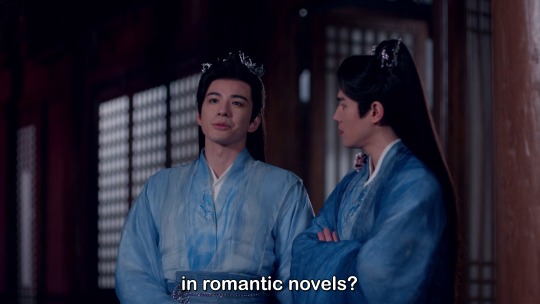

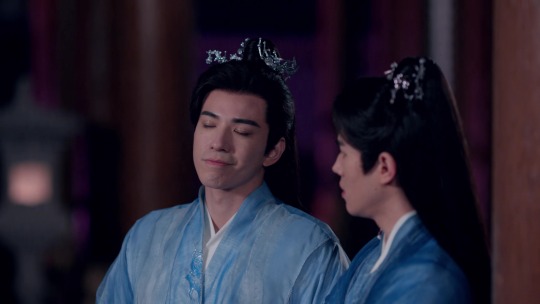



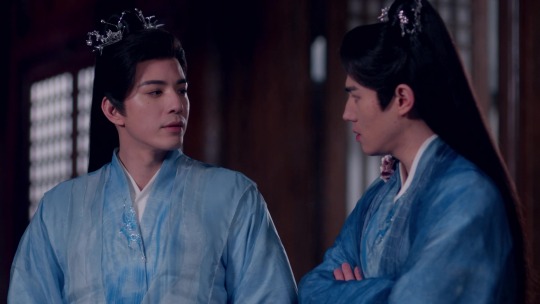






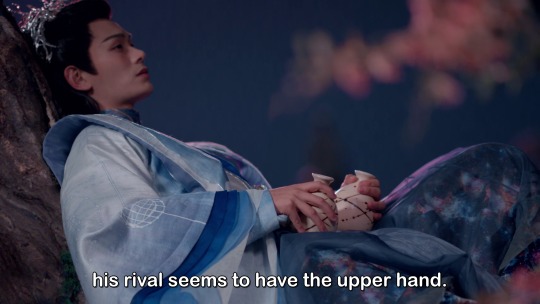
Romantic Novels for Dummies
184 notes
·
View notes
Text
CDrama Year in Review 2023
I'm still very much a CDrama beginner--I just started watching them in the summer of 2022--but since this is the first year I got into them in earnest, I figured I might as well do a year in review a la @dangermousie (whose lists I have found incredibly helpful in deciding which CDramas I really, really need to go back and watch as part of my CDrama education--so thank you!). So, without further adieu, here is my ranking of 2023 CDramas, in order of least enjoyed to most enjoyed*.
(See also: KDrama Year in Review 2023)
*Disclaimer: *not* a measure of objective quality
10. Royal Rumours: This drama was not great? Meng Zi Yi and Jeremy Tsui were fun, but the story started out messy and got messier. For some reason I still finished it, I think because I had a lingering cold and it was all my brain could handle at the time *shrug*
9. Gone with the Rain: I actually really enjoyed this one! The pacing was inconsistent, but Zhang Nan was fun as the irreverent Mo Xi, and we love a grizzled general. Special shout to the teacher who was not actually evil, just a sad lesbian whose gf disappeared on her
8. Love You Seven Times: Intriguing concept, not a strong enough FL to carry it through. The reincarnation stuff really worked for me at first, especially in their first mortal tribulation (as people, not CGI animals), but I got tired of it pretty quickly. I admit, the gifs of Ding Yu Xi as a sexy cat demon *did* pull me back in, but not enough for me to actually finish the thing, alas
7. Destined/Chang Feng Du: Started out really strong, and then stalled out on me. I think I only got up to about episode 22 or so, after their epic desert crossing and new start in a new state--they lost all narrative momentum for me there. I stopped watching and then just...didn't start again. I do, however, remain a big Bai Jing Ting fan, and will be keeping on eye out for whatever he does next
6. Hidden Love: (Contemporary) Age gap romances are hit or miss for me, but Zhao Lu Si absolutely stole/carried the show for me in this one. Although more fun imo when the main couple are in the the will-they-won't-they phase than in the family melodrama after they get together, still the only contemporary CDrama to get me to give it a go this year--and I'm glad I did
5. My Journey to You: Featuring my favorite murder girlies Esther Yu as Yun Wei Shan and Lu Yu Xiao as Shanguan Qian! Gorgeous costumes and sets, sweeping cinematography, and plot that kept me on the edge of my seat. Full disclosure, I have not actually watched the last two episodes because I got busy and then saw weird chatter about them, so I have no comment on the allegedly weird ending
4. Till the End of the Moon: Look, I know the ending wasn't ideal, but for the majority of its run, this drama owned my entire soul. It also introduced me to Bai Lu as Li Su Su, who inspired my first actual tumblr post (that wasn't a reblog) because I was so obsessed with her. And everyone knows that Tantai Jin is the CDrama ML of the year. 10/10, no regrets at letting it take over my life (and the OST my Spotify) from April to May of this year
3. The Story of Kunning Palace: More Bai Lu is always a good thing, and she's extra fun here as the transmigrated former evil empress and totally-over-your-nonsense Xiang Xue Ning here. The reverse haremness of it all totally shows why Bai Lu is the chemistry queen, especially with the princess (Liu Xie Ning) and cranky, morally grey, would-fail-gym-class strategist Xie Wie (Zhang Ling He). So glad this drama made it out of the CDrama vault and didn't languish indefinitely in censorship hell
2. A Journey to Love: Finished this one two days ago as of this writing and am still not normal about it. Ren Ruyi (Liu Shi Shi) and Ning Yuan Zhou (Liu Yu Ning) lead an exceptionally strong ensemble cast in this wuxia that explores the complicated relationships between love, duty, loyalty, loneliness, and companionship. Ruyi and Yuan Zhou are far and away one of my fave OTPs of the year, but just as compelling are the relationships between friends/brothers/fellow assassins Yu Shisan, Yuan Lu (ugh my heart), Qian Zhou, and Sun Lang. This drama definitely has one of the strongest ensemble casts of the year. And the character growth of Yang Ying from little princess abandoned in the cold palace to who she becomes by the end will stick with me for a long time. Plus another 10/10 OST!
1. Lost You Forever S1: I'm not normally a reverse harem girl, but the longing, loss, and hard resolve portrayed to perfection by Yang Zi as Xiao Yao really did it for me here. This whole drama struck an emotional chord for me, and where TTEOTM consumed my soul, LYF took over my heart. Xiao Yao's relationships with her power hungry, overprotective cousin Cang Xuan; hot snake demon Xiang Liu/playboy archery shufu Feng Feng Bei; and perfectly devoted Tushan Jing are all equally compelling to me, and while I may know who she ends up with in the end, who I *think* she should be with changes based on who's on screen at any given time. And A'Nian, my favorite bratty princess who really just needs some strong parenting, holds a special place in my heart. I know we may never get S2, and even if we do, censorship means it probably won't be what the drama makers are capable of, but I'm so glad for this little piece of absolute perfection. And, again, a top notch OST!
Fave Drama: Lost You Forever, by just a hair over A Journey to Love. See above.
Least Fave Drama: Royal Rumours--truly why did I finish this, what was past me thinking
Biggest Disappointment: 2023 is also the year I read Dreamer in the Spring Boudoir, my very first CNovel! But then I didn't even bother checking out its adaptation, Romance of a Twin Flower, because it got rid of everything that made the novel such an addicting read, including a brilliant, strategic, ice cold FL and an ML who actually kind of sucked at the beginning, only to grow on you very, very slowly over time. I'm grateful that the chatter around the drama is what brought the novel to my attention, but other than that, hard pass.
Favorite Male Character: Lots of good ones this year, but I'm gonna go with Cang Xuan (Zhang Wan Yi) from Lost You Forever. The conflict he faces between getting enough power to protect the people he loves the most and that power making him incompatible with those loved ones is so compelling, and his yearning for Xiao Yao even when she's right in front of him is wrenching. Full disclosure, I also just really love the sound of his voice

Favorite Female Character: This could easily have gone to Li Susu (TTEOTM), Xiao Yao (LYF), or Ren Ruyi (AJTL), but I'm gonna go with Bai Lu's Xiang Xue Ning in The Story of Kunning Palace. Something I really loved about this character was just how jaded Xue Ning really was, even in her second go round at life. Yeah, she wants to make amends for the harm done in her previous rise to power, but that has hardly turned her into a good--or even pleasant--person. Instead, she's incredibly skeptical and still plays most things ice cold, especially with her family. As a bonus, we got plenty of Bai Lu's fantastic side eye as she basically had to do high school all over again when she gets called into the palace despite her very best efforts not to be.
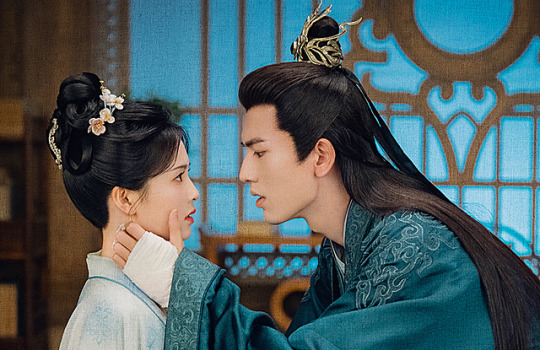
Favorite Ship: Ren Ruyi and Yuan Zhao from A Journey to Love have got to be it. They balance each other out so well, and over the course of the drama, learn to communicate effectively with each other whenever they have a problem. They also recognize that not all problems can be solved by ~love~, which makes their relationship even more compelling when they decide to prioritize each other in a way that respects what the other wants from life.
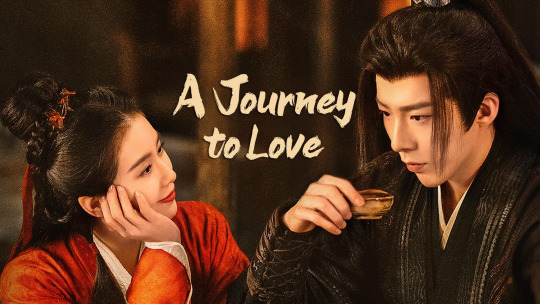
Favorite Secondary Ship: Little princess Yang Ying and Yuan Lu absolutely broke stole my heart in A Journey to Love. Doomed love even more than the main OTP, these two's youthful romance was such much fun to watch, especially as they egged their respective mentors on in their own romance. Yang Ying's recognition that her first love did not have to be her only love is also something I always love to see, even as it broke my heart that (spoiler) she and Yuan Lu never really had a chance at an HEA. Their relationship really exemplified a key theme of this drama: that you should love the people you love while they're still with you because tomorrow is never promised.

Non-2023 Dramas that I Watched: Two non-2023 dramas I watched that deserve a special shout out are Love and Redemption and The Sword and the Brocade. Love and Redemption prepared me to really appreciate the big swings that Till the End of the Moon took, and The Sword and the Brocade went a little way to filling the Story of Ming Lan shaped hole in my heart. The Sword and the Brocade also had absolutely searing critique of the concubine system, even as it featured one of the most genuinely good-hearted FLs I've seen. Would recommend both!
Most Looking Forward To: Yes, I'm a sucker and the censors (not to mention the characters) will probably break my heart, but I'm still crossing my fingers that Lost You Forever S2 will live up to the promise of part one. See above: still a CDrama beginner, have not yet had all the optimism knocked out of me. Sue me.
#CDrama#year in review#Lost You Forever#A Journey to Love#The Story of Kunning Palace#My Journey to You#Hidden Love#Chang Feng Du#Destined CDrama#Till the End of the Moon#Love You Seven Times#Gone with the Rain#Ren Ruyi#Yang Ying#Yuan Lu#Bai Lu#Meta#CDrama Review
72 notes
·
View notes
Text
Guardian really set my expectations of "censored bl cdramas" and man that was a high bar and probably not fair of me to expect.
Guardian really opens with Zhao Yunlan asking Shen Wei "are you married? You're such a catch. Can I take you out to eat? Here's my number A-Lan call me" which like even on face value id say thats called flirting (unless I guess ur so straight Straight blinders on that 2 men have to physically fuck in front of u to consider something gay)
Then of course there's shen weis pining shit but like, that's not Hammer down obvious to I guess the most oblivious person in denial
But Zhu Hong saying she likes Zhao Yunlan, Zhao Yunlan repeatedly refusing her and feeling bad about it, Zhu Hong repeatedly acknowledging he picked SHEN WEI over her (making it fairly clear it was a romantic pick and she Lost it to a guy) and shen Wei, brick that he can be at times, tells her it will only take a few years for the feelings to fade when she'll get over Zhao yunlan. The guy in love with him, instead of her. Yeah shen wei, she's definitely not wishing she could stab you for that insensitive remark. But she's too good of a person to.
Which. I'd say the above two points establish fairly overtly that: Zhao Yunlan is into men, that his colleagues assume he's also into women (if Zhu Hong thinks she has a chance), and that Shen Wei is Zhao Yunlans romantic pick. So Shen Weis sexuality? Well he doesn't dispute being Zhao Yunlans romantic pick, and Lin Jing assumes they're lovers with dialogue (yes he's saying opposite day stuff but his opposite day is just not being a liar and spy). So Shen Weis sexuality includes Zhao Yunlan.
And so like that's just. Fairly overt explicit stuff about their relationship. There's also the "a very oblivious person could argue its only implied" flirting. (And everything going on with Lao Chu and Xiao Guo, the side couple... oh my heart ;-; when they almost froze... the family dinner at Xiao guos... Lao chu admiring how kind Xiao Guo is, scaring him trying to say he's a cannibal and Xiao Guo not running away)
There's the coat sharing macho trying to be the man helping the damsel both of those fuckers do galore, shen wei moving in across the hall (which is either stalker or deeply in love or - as is true, both), shen wei implicitly moving in (this one's vague ill admit to be fair), the fucking "You're good with your hands" line from Zhao yunlan which is absolutely a porn line, every villain in the show viscerally aware Zhao Yunlan is who Shen Wei wants to protect, Ye Zun pretending to be Shen Wei by calling Zhao Yunlan cute names and asking if his outfit looks nice (and all of That), Zhao yunlans romantic ass hit me through the heart line of "if you're trouble I want a lifetime of you" at the wedding (not ever over it), the fucking lollipop scene in ye old haixing. Just a bunch of flirty type scenes, romantic tropes galore. And that's not even covering the actual genuine subtext of ALL the cases paralleling how shen wei and/or how Zhao yunlan feel implicitly (which are just subtext to be fair... how shen wei thinks he lost kunlun, how Zhao yunlan ISNT him so it hurts he's a stranger or he IS in which case he's a liar and shen weis grieving, the case where a dixingren and human love each other and Zhao yunlan notices he wants to be close to shen wei even though shen weis lying etc).
Like. They felt as canon as Tara X Willow in Buffy. Or at least as much as Xena x Gabrielle, the center relationship of the show where all stories of the episodes are always at least in some way about them.
#guardian#weilan#meta#rant#to be fair: word of honor cdrama did JUST as much as guardian on feeling basically canonically explicitly gay#as long as u can interpret overt flirting with men and them being soulmates as love.#cause yeah there are no kisses. but still like... yeah theyre in love.#and like.. man zhu hongs love triangle plot is Central in making the Guardian romance as overt as it is#obviously irs easy to put in: its a girl love interest for zhao yunlan#but its also a love interest he Rejects for shen wei. so like. cdrama land says he cant say i love you to a man?#but he can say he doesnt love a girl and hes picked the man instead. im just saying it works well to make that overtly clear#dont even get me started on chuguo ;-; i love them so much and acting defijitely helped intensify it
141 notes
·
View notes
Text
today, i wanna talk about this point that i've referenced a couple times across my yrzx fics:
For the fate of the world, Wang Ye relinquished his days of peace and tranquility. To save Zhuge Qing’s life, Wang Ye could sacrifice everything beneath the heavens. (from 岁月不待人 | the moon and the tides, you and i)
i'll start during Beijing arc, when ZCL asks why WY doesn't just give up Feng-hou Qimen to the ppl who want it.
in the manhua (ch. 185) & donghua (s3, ep. 3), WY's response is vague: "for various reasons, i can't give out [that power]."
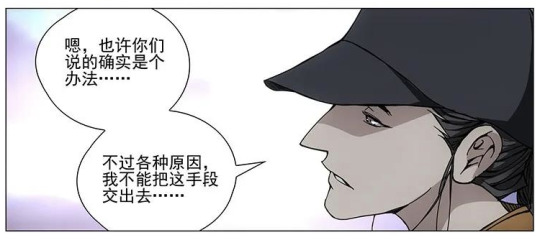
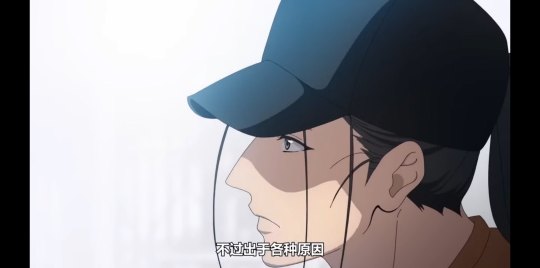
(note that the dialogue differs slightly btwn these two adaptations, but the meaning is the same)
but in the live-action (s1, ep. 22), WY clearly explains that "it would throw the ways of this world into greater disorder. this calamitous fate must be shouldered by me alone."
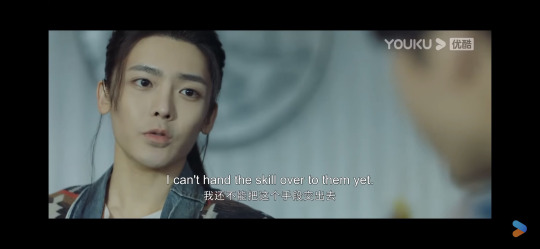
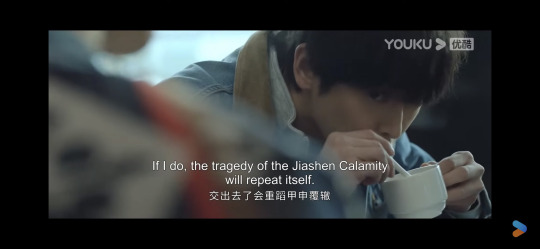
these lines perfectly demonstrate one of WY's most defining traits: 心怀天下 / a heart that cradles everything beneath the heavens.
we see it first during the tournament arc, when WY admits to ZCL that he didn't need to get involved in this mess—but did so anyway because the fate of the world was implicated.
WY: Actually, whatever happens to you all has nothing to do with me. No matter how terrible the world ends up, I can still protect myself and my family and keep us unscathed. So, actually, I shouldn't have come here.
[...]
ZCL: What you mean is that if I continue my investigation, the future of this world may very likely develop in a bad direction. Daozhang, who this "bad future" impacts isn't limited to only me, right? The two of us are neither kin nor kith; you wouldn't have come to get caught up in these troubled waters because of me, right?
WY: This, involves another concept. I call it the weight of fate. [...] And you, Zhang Chulan, you hold a high ratio of that weight. Your choice will change the fates of many, many people. (LA s1, ep. 14; see also manhua chs. 121-122 & donghua s2, ep. 12)
this is the extent of WY's selflessness. and as his conversation w ZCL continues, something else is revealed to us.
ZCL: The you who could have stayed out of this matter entirely chose instead to come here and persuade me. Did you also not choose the future that would have been best for you? (LA s1, ep. 14)
that 'something' is none other than WY's conduct: 明知山有虎,偏向虎山行 / knowing full well the mountains harbor tigers, yet insisting on traveling deep into the mountains anyway. or, in other words, the practice of forging on into promised danger.
which, coincidentally, is exactly how WY praised Zhuge Liang's character during his match against ZGQ.
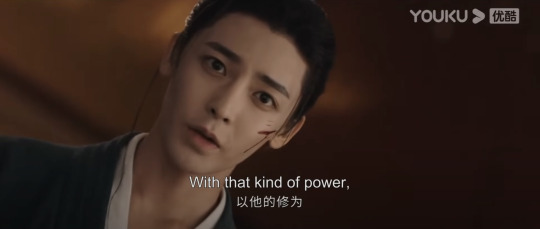
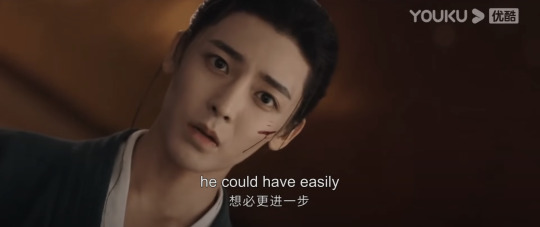
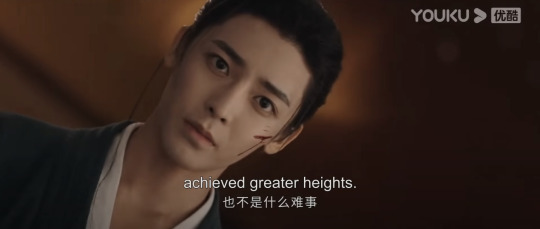
可他却放弃了作为一个修者该坚守的一切。就算逆大势而行,也要投身到乱世当中,只为了去救那个明知已无可救药的天下。/ But he chose to give up everything that a cultivator should uphold and protect. Even if it meant opposing the momentum of the times, he threw himself utterly into chaos of the mortals—all to save a world he knew full well was beyond redemption.
为了那个天下情愿去和天理和大势对抗 / For that world, he was willing to hold off divine order and destiny itself.
明知不可为而为,这就是他那个级别的术士作为。/ To do something knowing full well of its impossible nature—this was the practice of a sorcerer of his caliber. (LA s1, ep. 13; see also manhua ch. 110 & donghua s2, ep. 10)
with such a heart of compassion (怜悯之心, HMH's words) and sense of responsibility, WY is unlike anyone else in his generation. instead, it can be argued that the character most similar to WY is in fact one of his seniors, lao-Tianshi.
they are, at least in the LA, the only two 麒麟 in the story after all (s1, eps. 8 & 20):
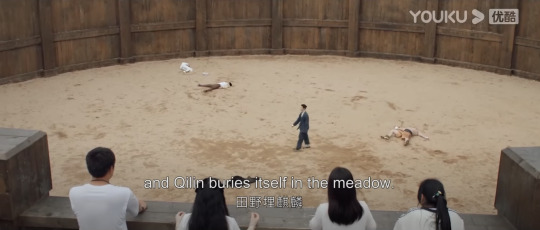
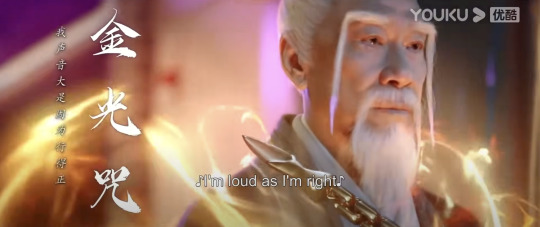
and just like lao-Tianshi, it's easy to think of WY as a saint (圣人) or a god—something "above" mortal humans. he's operating on a scale (格局) far greater than anyone else in our main cast; WY is always taking the whole world into consideration, even if that's the choice least favorable to him.
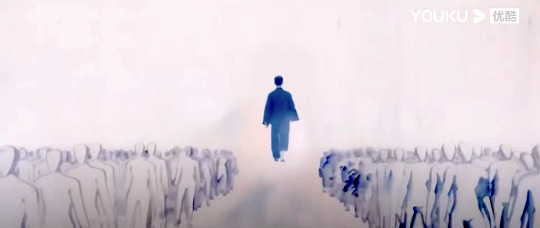
(LA s1, ep. 23)
and then Beijing arc happens. and by the end of it, WY has an epiphany:
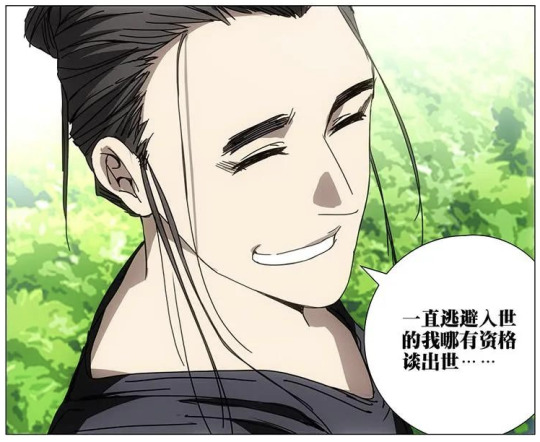
“The me who has always avoided involvement with worldly affairs has no right to speak of leaving them behind.” (manhua ch. 196; see also LA s1, ep. 23 & donghua s3, ep. 7)
he's begun to have a reckoning with his own human-ness. he's starting to realize that he's fallible, that he's ordinary and secular, that he has attachments—and, importantly, that he wants attachments. that he desires companionship (just as humans are wont to do).
and it's with that moment of enlightenment that we dive into Biyou Village arc.
because, overall, WY has not actually changed that much. he still feels responsible for the peace and safety of the world; he still wants to figure out how ZCL and FBB are related to the Jiashen Calamity. he still remembers clearly what Hong-ye said: "you are the chosen one." (LA s1, ep. 4)
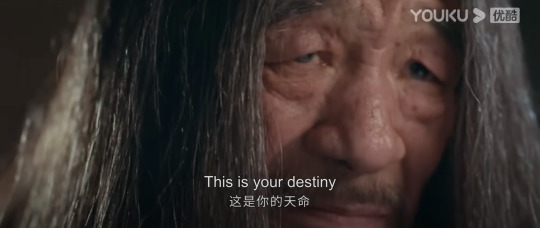
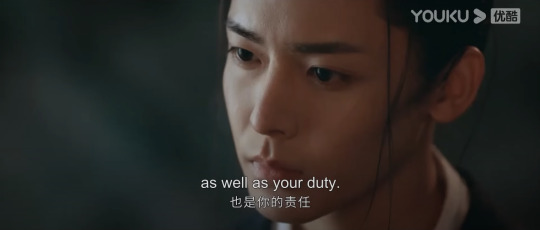
and even ZGQ himself remarks (manhua ch. 228; see also donghua s4, ep. 5):
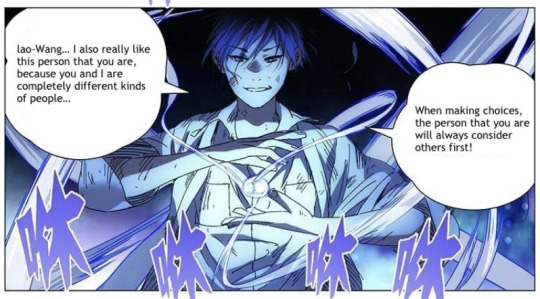
yet when ZGQ's safety is at stake, WY doesn't hesitate for even a moment:
(donghua s4, ep. 5; see also manhua ch. 228)
that is not the conduct of someone who always thinks about the bigger scheme of things. that's the conduct of someone making a choice for himself, an arguably selfish choice, to save his friend and doom everyone else.
WY would sooner give up his Feng-hou Qimen and restart the Jiashen Calamity than see ZGQ in danger. that is how important ZGQ is to WY.
在王也的心中,诸葛青的命比天下苍生还重要。/ in Wang Ye's heart, Zhuge Qing's life is more important than everyone in beneath the heavens.
and that's because ZGQ is the first of his generation to approach him. to make an effort to befriend him. to look beyond the power he possesses and also see him.
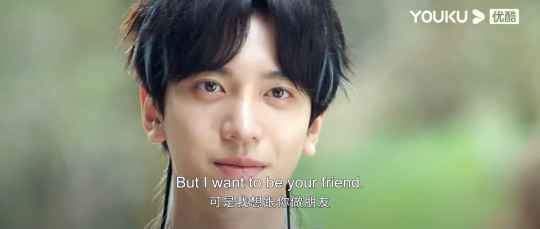
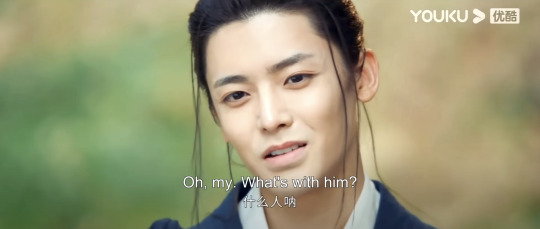
(LA s1, ep. 15; see also manhua ch. 131 & donghua s2, ep. 14)
in other words, it was ZGQ who made WY's godlike love for the world human. WY is no longer an outside viewer looking down on the plane he feels beholden to; WY is a part of this secular world, and that is why he should want to protect it.
because the red dust realm is where ZGQ exists. here is where their bond exists.
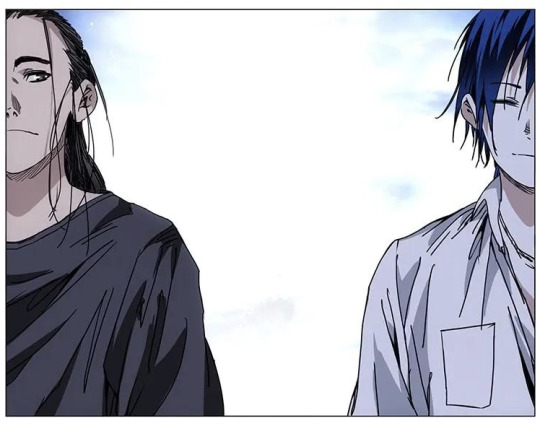
(unrelated pic from manhua ch. 196; see also donghua s3, ep. 7)
tldr: Wang Ye places the world before himself, and Zhuge Qing before the world.
—
all this to say, i really am excited for s2 of the live-action, even though the casting rumors have been disheartening. Biyou Village arc is a climactic chapter for YeQing, so i hope the adaptation does it justice.
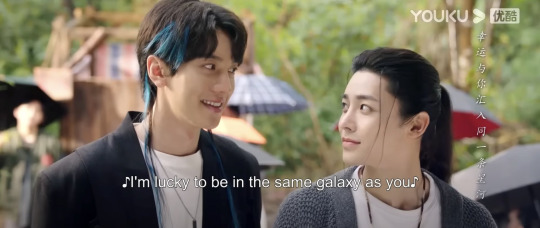
(LA s1, ep. 27)
#异人之下#i am nobody#cdrama ramblings#yeqing#一人之下#hitori no shita#crossposted from twitter but this version is much longer lol#does this count as meta? i always hesitate to use that word bc i read other ppl's stuff and im like WOW#THAT'S MINDBLOWING#but i feel like this is just 'they really really care a lot about each other please cry with me'
29 notes
·
View notes
Text
"Out of time" - Appreciation post for Li Susu portrayed by Bai Lu


Out of time: Traumatized Time Traveler
Li Susu is chosen by fate, time and birthright to fight the Devil God. She has bravely faced him to protect her family, her sect and her world - and lost them all in the blink of a (red, sexy) eye. Travelling 500 years into the past to prevent the rise of the Devil God has left her traumatised and overwhelmed. On top of that, she has to find her way into Ye Xiwu's life, which has left her a mess.
Through it all, Li Susu never loses her distinctive personality. She has a strong moral compass, cares and loves easily. Within a few weeks, she reciprocates the love of Ye Xiwu's family and, according to Bai Lu, develops feelings for Tantai Jin's relative early on. She is also cheerful, cheeky and stubborn, but also smart and modest. This is where Bai Lu's charisma, chemistry and comic timing really shine.
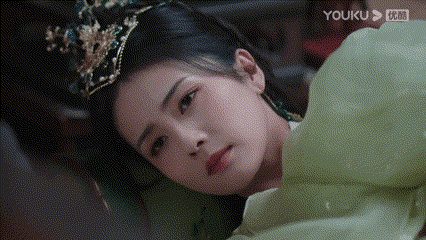
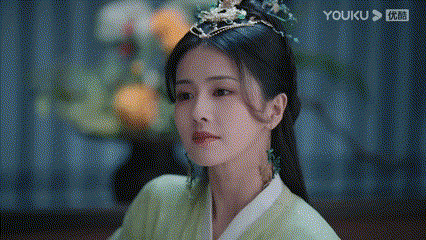
As an audience, we see the world through her eyes. I have seen complaints about her early behaviour - described as cruel and contradictory towards Tantai Jin. It seems that one thing that divides the audience of Till The End Of The Moon isn't simply their opinion of Ye Xiwu early on, but rather the ability to emphasize with her character and behaviour. It seems that some people fail to understand her complexity. She is not mean or vengeful, she is overwhelmed and traumatised. Li Susu struggles to find the right path between her own morality, her developing feelings for Tantai Jin and her mission. I find this inner conflict fascinating and well portrayed by Bai Lu. She doesn't act in a logical way - but how could she do such a thing given the extraordinary circumstances she faces? I think the inner logic of her character is coherent.
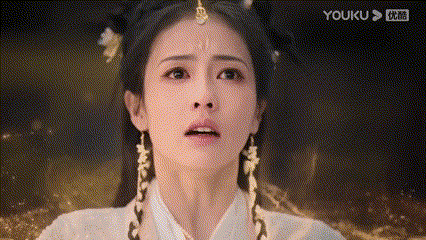

Her introduction as the main character is well done, both in terms of writing and acting. We meet her at one of the worst moments of her life, which gives Bai Lu a chance to show off her acting skills right away. For me, a lot of dramas lack compelling female leads, especially before the character development unfolds, so seeing Li Susu's emotional turmoil in the first episode gave her depth and range from the start.
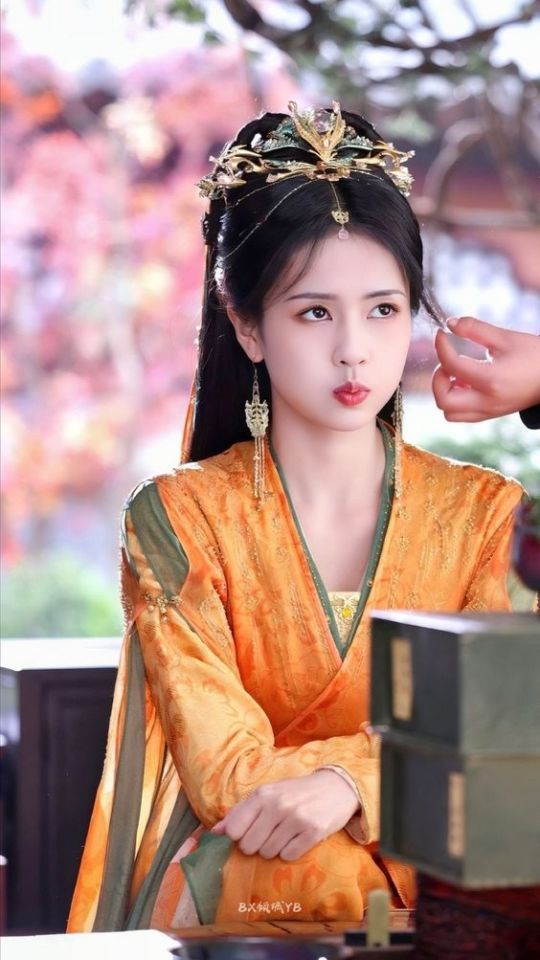
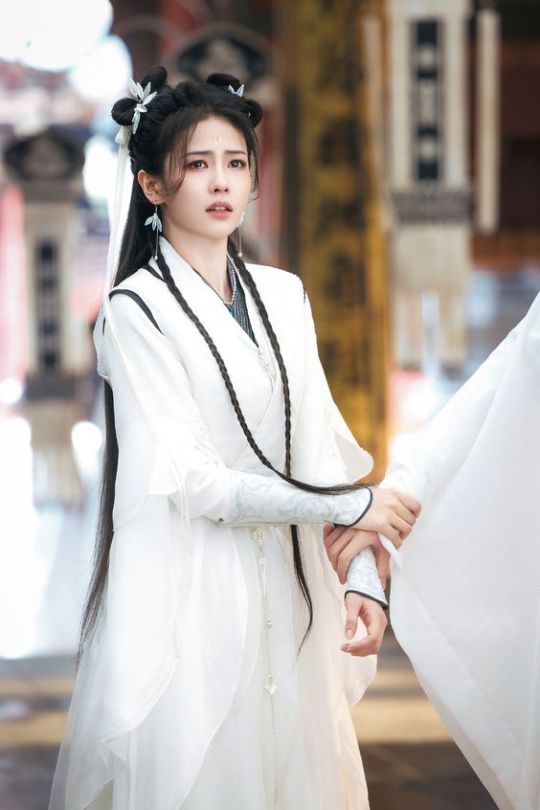
Out of time with the society around her
There is another meaning of the phrase "out of time" which I think fits Li Susu quite well: In the musical sense, it means "not in accordance with the appropriate musical rhythm or tempo". It refers to her not dancing to the same beat as everyone else around her. This is not only because of the time travel, but also because of her upbringing as an immortal "pure spirit body" in an isolated sect. This position as an outsider makes her a more relatable character to modern audiences.
Li Susu doesn't fit into the social and gender roles of her new era. Like the century-old demon Pianran, she defies these norms. She is free-spirited but righteous, conflicted but persevering.
The show challenges us to root for more multiple characters whose goals are at odds with each other. And if the audience is able to keep track of these different perspectives, and keep up with the tension of the resulting contradictions, the plot becomes a nuanced and complex story about the greater good of the world as well as the struggle to control one's own destiny.
I found Li Susu very likeable and enjoyed her journey through three arcs. However, I regret that the last arc was cut and that her character development was not allowed to fully unfold.
Out of time in her relationship with Tantai Jin
Li Susu and Tantai Jin are out of time in every sense of the phrase. As they travel through three arcs, three worlds and two lifetimes, they are never quite on the same page, never quite in sync.
In the first arc, Li Susu hides her true intentions and can therefore never fully reciprocate Tantai Jin's feelings. Tantai Jin then spends 500 years desperately searching for a spirit whose real name he doesn't even know.
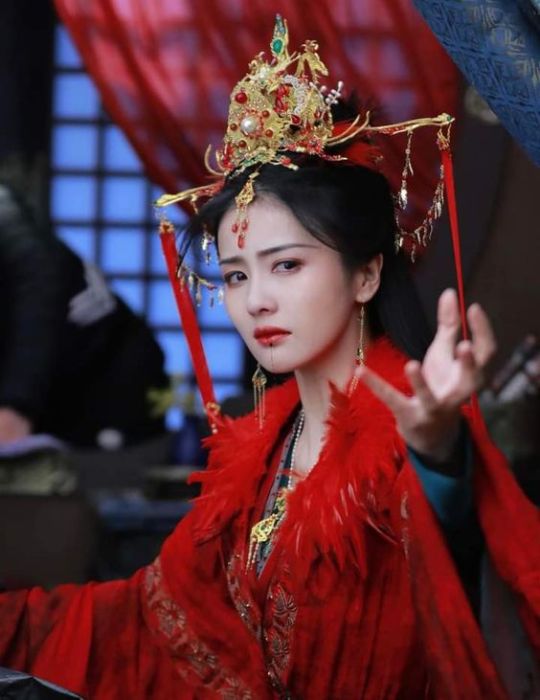

In the final arc, Li Susu tries to move on from Tantai Jin while he still tries to resurrect Ye Xiwu. Once reunited, she tries to peruse the Heartless Way to seal the evil bone, while he tries to win her back.
They only get into rhythm for a brief moment after their betrothal before they are separated in preparation for their wedding.
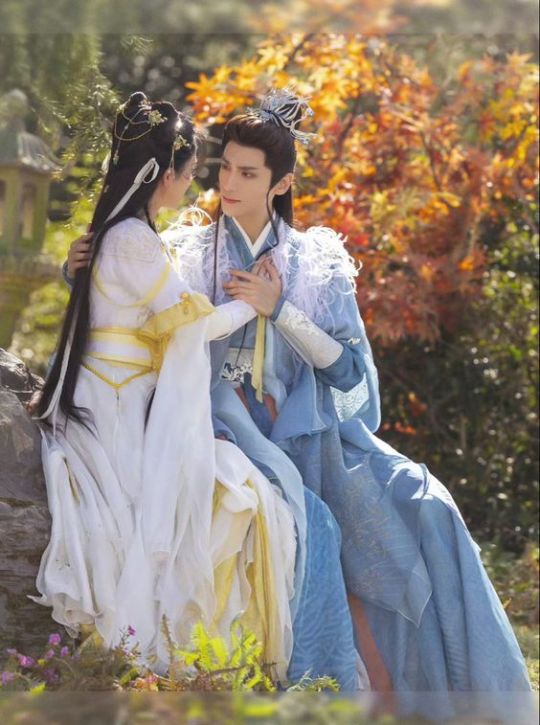
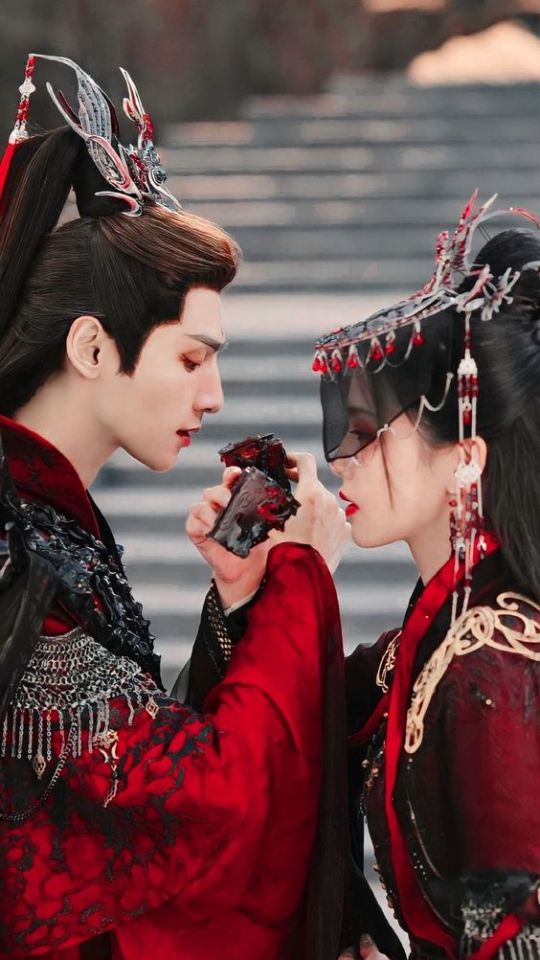
In the final episodes, their initial roles are reversed, with Tantai Jin hiding his true intentions for the greater good and lying to Li Susu. He is running out of time to let her ascend to godhood and stop the All-in-Distress Way before it destroys everything. Even as gods, they are still not on the same page, as Tantai Jin denies her the choice to follow him into death and rebirth, instead tricking her into living on alone.
Nothing symbolises this theme better than the final scenes at their graves: visiting them and mourning each other at different times, never to be reunited again. This scene is so heartbreaking that even after watching the show four times, I still can't make GIFs of it because it makes me cry.


Never out of place: Bai Lu's acting
Bai Lu's acting is another highlight of the show. While her chemistry with Luo Yunxi is well documented, she actually manages to have great (non-romantic) chemistry with the entire cast. Their relationships always feel ingenious and alive. Between Luo Yunxi and Bai Lu, the showrunners have managed to hire four very impressive and emotional eyebrows!

Bai Lu's facial expressions are always on point and elevate her scenes. While her approach to comedy involves exaggerated facial expressions, in more serious moments she is able to portray many different emotions at once without it feeling out of place.
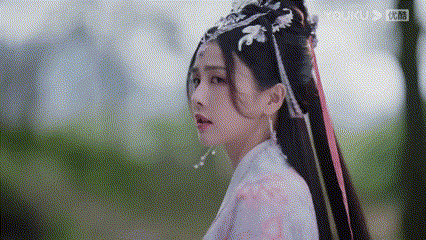
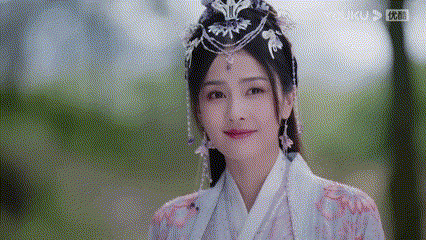
I have talked a lot about Luo Yunxi's acting in the show, but I think Bai Lu deserves a lot of credit for her role beyond their chemistry. She is such a joy to watch on screen! From funny to heart-wrenchingly sad, she made me go through so many emotions and tissues. To be able to touch the audience in such a profound way is the highest compliment I can give her!
Behind the scenes, Bai Lu is a vibrant and dedicated person who gives her best to every scene: Be it immersing herself in mentally demanding or physically exhausting scenes. I'm looking forward to getting to know more of her acting.
Edit: Spelling!
121 notes
·
View notes
Text
Story of Kunning Palace - Jiang Xue Ning - Part 1
There was something I wanted to touch upon about Jiang Xue Ning (Xue Ning) specifically the part about the first life.
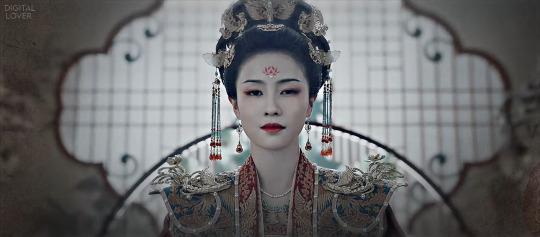
All we know about the first life and her actions therein are largely from Xue Ning's perspective. Since we're limited because of this perspective, it is also hard to judge just how "evil" she was. She certainly judges herself very harshly but let's dig a little deeper.
For the purpose of clarity, I'm going to break this up into a few key points that I think would illustrate what I'm trying to say, the post is split into 2 parts:
PART 1
1) Early Life
2) Desire for power and control.
3) Ning's desire to be loved.
PART 2
4) Alliances in first life and her influence in 2nd life
5) Ning's Personality
6) Conclusion
EARLY LIFE:
Wanniang, Xue Ning's father's concubine, switched her own daughter with Xue Ning, partly out of spite because she was being thrown out and partly because she wanted her own biological daughter to have a good life (a massive fuck-you to the Jiang family)
On her deathbed, Wanniang confesses to Xue Ning about what she did and that she has informed the family as well. Once, Ning's back home, she's faced with a family that she knows nothing about. Her father, in her first life, was largely indifferent towards her, her mother was outright hostile (she remained the same for a large portion of the 2nd life as well) and finally there was Xue Hui, the usurper. Her entire life, up until that moment had been a massive lie and one that had absolutely nothing to do with her, she was just unfortunate to get caught in the crossfire.
If we look at things from Ning's perspective, she was raised by Wanniang and thinks that Wanniang didn't really care about her, she talks about her insecurity both in the novel and show, when she says that Wanniang would sometimes look at her as if trying to see someone else in her face, or that she'd suddenly pull away from Ning. It was only later that Ning realised why that was.

At home, she always felt like an interloper. She knew that when her mother looked at her, she saw Wanniang and would not let go of that prejudice. Her father had no influence at home (he's repeatedly told that he should leave the home front to the wife) and the sister, who is so damn virtuous that there's no way that Ning could compete with her.
Her ambition then, to become the empress, makes complete sense, it stems from wanting power and control over her life.
DESIRE FOR POWER AND CONTROL:
This is tied to her early life where she felt that she had no control. It is easy to see why she would want to be the empress because the only person more powerful than her would be the emperor. But never again would she be left unable take the reins in her life. I'm going to go in deeper into how she did that in another section.
Her pursuit for power and control stems from her perceived lack of either in her life. She felt like she didn’t have any agency, all of the things that had happened were due to other people and the decisions they made, no one considered Ning’s feelings or what she might want to do.
That she pursues Shen Lang is for 2 reasons, his older brother is sickly and sooner or later, it would be Shen Lang on the throne. The 2nd is that she sees it as balancing the scales. Since Xue Hui took everything that was meant to be hers, she would take Shen Lang, it's that simple. It's fortunate that Shen Lang is a decent man and while Ning was never in love with him, she did care about him.
DESIRE FOR LOVE:
Ning herself would beat up anyone who dared to say that she was driven by her desire for love. Now, some might be thinking that in that case, why did she rebuff Yan Lin who so clearly liked her? That's partly tied to her desire for power and control. She's so incredibly haunted by what her life was like, everything that was taken from her and feeling unwanted by her own family.
She knows that love doesn't mean a damned thing if she's still powerless and ultimately her need for power overshadows any tender feelings she might harbour for Yan Lin. She feels used by the people who should have been looking out for her. Ning thought that Wanniang didn't love her and she could probably deal with that if she got along with her 'birth' family but she instead found herself alienated from them as well. I imagine she felt that there since there was no one in her corner, no one to protect her, she would have to do that herself but that also came from a place of hurt and disappointment. Her attitude towards and treatment of the people in her first life reflects her vindictiveness, she's going to use them to get what she wants.

Ning's actions in the first life are largely driven by her hurt and the all the trauma she's experienced. Imagine coming home to your "family" and realising that you're the outsider. Her desire for power and love are so deeply intertwined that I doubt that Ning herself could differentiate between them. She’s been hurt by people who should have cared about her, accepted her, and she will be damned before she lets anyone else do that again. It never occurs to her that there are people who could genuinely care about her and moreover she doesn't let herself consider that they might care.
It is only once she comes back that she has more information and context and she spends more time with people like Xie Wei, Shen Zhi Yi, Yan Lin, etc that she realizes that maybe she was wrong. Time and distance allow her to see people more clearly now that her judgement is not clouded by her prejudice, by her hurt. It's why she realizes that Shen Zhi Yi is very clearly in love with her (that's just not up for debate) and even at the end of the first life, when Xie Wei gave her the knife, maybe he did want her to have something to defend herself with. Xie Wei had to know what Yan Lin was doing every night but being an ally, he probably didn't want to alienate him, so instead gave Ning the dagger to protect herself with.
In keeping people at an arm’s length lest they hurt her, Ning doesn’t realise that she’s also closed herself to people who might genuinely care for her and I think she does realise that. It’s just that she figures that it’s a fair trade, she’s convinced that love and regard won’t last in the long run but shared interests will (hence her relationship with Zhou Yinzhi) but she only had to look at You Fangyin to know that people do have the ability to surprise you.
Click for Part 2
#the story of kunning palace#cdrama#sokp#sokp spoilers#xie wei#jiang xuening#shen zhiyi#bai lu#you fangyin#character meta#character breakdown#kunning palace
20 notes
·
View notes
Text
So why did I (elite hater of all sad ending dramas) watch & enjoy A Journey to Love?
ah because my devout hateration has 1 key loophole: as long as the main character(s) death is baked in as essential aspect of the story and it's clear from the start then (if the series is very good!) I can accept that I'm merely watching the mystery of how-do-we-get there. The tragic ending has to be sign-posted in all the episodes AND I need to get my full emotional catharsis before the anticipated end.
I knew what I was signing up for with Nirvana in Fire. As a viewer, I just wanted to see him achieve his goals before his time ran out! With a Journey to Love the screenwriter told the viewer a zillion times that this is an impossible mission that likely they all must sacrifice their lives to achieve, and the characters explicitly accepted that, in text. They fantasize about an 'after' but I never thought the characters believed in it deep down - it was a story they needed to tell each other to be able to press forward & feel less lonely. Like Shisan kept up a good face and played comic relief to lift his and everyone's spirits.
It was so clear to me as I was watching that whole reason all the love scenes & therapy & personal growth was taking complete screen time precedence over plot was that THIS WAS THE REST OF THEIR LIVES. The show enthusiastically wallowed in all the personal relationships and romance so the viewer doesn't feel cheated, like you would if these people came together admid a sequence of complicated adventure & politics plots and their lives end without a chance to have all these ups & downs and deep personal moments... the show sped thru plot & action in order to give 80% of screen time to the personal relationships and exploring character psychology. That was the 'trade' ... the devil's bargain I felt I had made, my reward for accepting the Tragic Ending.
But tbh I am still alarmingly difficult to please in this fashion: the writer must coincidentally want to explore the themes I'm interested in & to go in the narrative direction that I want. For instance, I would have regretted watching & felt it a waste of my time if my galaxy brain thoughts about the cast's widening perspective & priorites & personalization of the enemy country citizens and their competing army/spy units hadn't played out exactly as I wished. (lmao when Qian tells fail emperor, "now I want you to stay alive for the hundreds of thousands of people of both An and Wu" I fuckin screamed. yaaaaaaas the journey is complete we did it kings 👌 👌)
89 notes
·
View notes
Text
wuxia and confucianism
Hey. Thought I'd answer the wuxia-confucian question very briefly. I did suggest wuxia being closely knitted to confucianism, but I do understand the other perspective of wuxia being anti-confucian. Quick answer only because I've got little time right now -- might add on to it later!!

confucianism
First the central themes of confucianism:
常 (cháng): Virtues of compassion and courtesy. 仁 (rén)、义 (yì)、礼 (lǐ)、智 (zhì)、信 (xìn)、忠 (zhōng)、孝 (xiào)、悌 (tì) (there are more). These in order in crude translation mean compassion, righteousness, courtesy, wisdom, integrity, loyalty, filial piety, and respect to one's older siblings. These are the main ideas Confucius, the founder of Confucianism, wished to spread through his philosophy.
纲 (gāng): Order. This is about the relationships between people, the filial piety of child to their parents, the relationship between significant others, between friends and teachers, and expanding outwards in the sphere of influence in our circle of life, the patriotism and loyalty of a liege to his lord.
Understand that Confucius came up with these ideas in a time of war. He lived his life traversing different kingdoms and establishing his prominence by getting emperors to trust him as a consultant and employ his school of ideas. As such, these beliefs are very much centred around creating harmony and order in society, and of course entails the respect of commoners and lieges to their lords (because why else would kings employ his beliefs over other schools of philosophy if not so?).
wuxia
Moving on to the wuxia genre, the 侠 (xiá) in wuxia emphasises righteousness. xia, as people, are itinerants and rebels in the fictitious pugilistic society who tire of the power of the aristocracy and seek to use their own, often unlawful ways, to help others through 锄强扶弱 (chú qiáng fú ruò) -- helping the needy and going against the strong (the morals are debatable but that's me trying to sum up wuxia in 5 minutes off the top of my head rip).

conclusions
So I guess that's enough information for you to form your own conclusions, and here's what I think, at the very least.
Against Confucianism -- Subverting the power pyramid. Many of the heroes/xia's in wuxia are lawless rebels. They aren't good, upstanding citizens of the society. Hell, xia was first popularised from 游侠列传 (yóu xiá liè zhuàn) in the Han dynasty records, talking about how a "xia" went against the officials and helped the commoners in the name of righteousness. This goes against the confucian beliefs of respecting your lord and serving the kingdom.* That's why I can understand why some would consider wuxia going against confucianism.
Align with Confucianism -- Righteousness. Ultimately, however, wuxia is about righteousness and nobility and honour, defined by society and commoners and not by royal blood. These values of etiquette, decorum, and nobility were long ingrained in the hearts of all these chinese characters, from when the courtesy and etiquette rules were defined in the Zhou dynasty, and afterwards, from the Han dynasty on, when emperors heavily employed Confucian beliefs in education and throughout society because it helps in rebuilding a harmonious society.
Confucianism is about compassion and righteousness, the staples permeating and defining chinese culture in the last two thousand years, and it is these values that serve as the central impetus of the xia and wuxia genres. People are born into these values; as such they fight against the injustice they see, and thus engenders the lost xia's of every dynasty.

*And well, even Confucius wasn't that dead set on fealty to lords. Confucian highly venerated loyalty, but when the court is corrupt, they acknowledge insurgence over the mindless following of an emperor. This is a story for another day, one I would have to back up with more quotes and citations, but I hope this answered your questions, or even better, let you form some conclusions of your own :)
Confucian philosophy is only one aspect that has correlations/influences over the "xia" genre, there are many other interesting things to say about Taoism and Buddhism as well (e.g. Jin Yong's wuxia classics have quite a bit of Buddhist values in the characters owing to author preferences), it's definitely worth looking up on these things if you're interested!
initially reblogged under the original meta post on wuxia, xianxia, and cultivation differences, but i realised it was too long and would bury the reply, so please don't mind me opening a new post for this again.
feel free to ask and discuss!!
#chinese#cdrama#danmei#philosophy#chinese language#chinese culture#wuxia#cnovel#chinese history#confucius#confucianism#chinese philosophy#fate's meta
390 notes
·
View notes